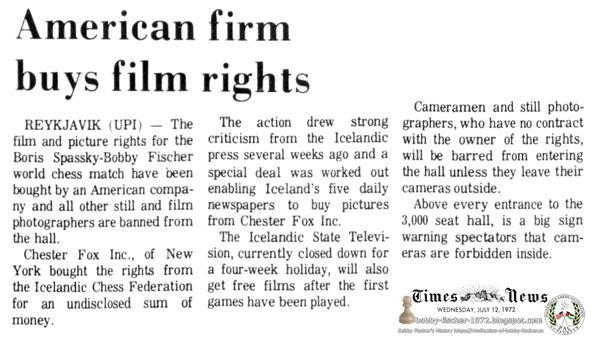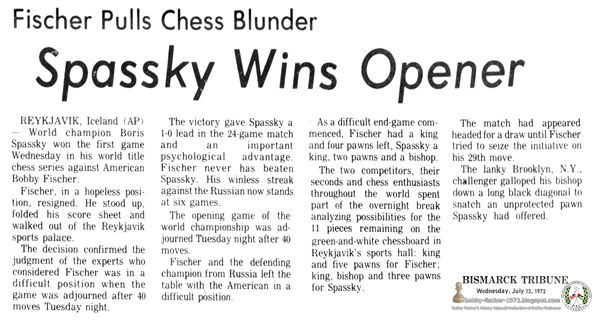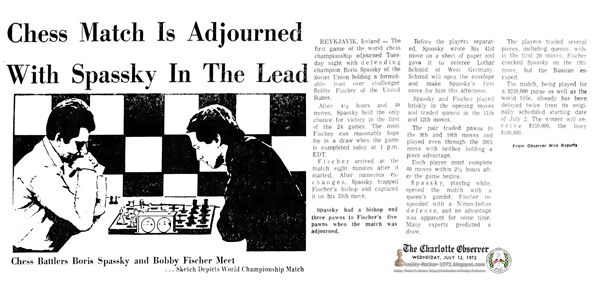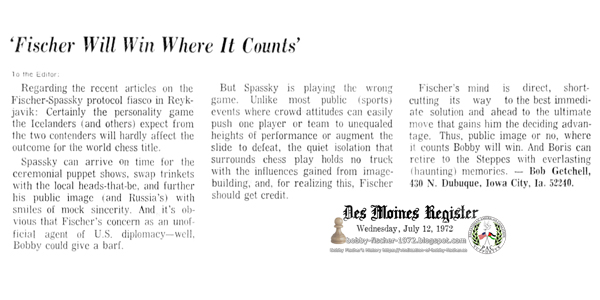New York Times, New York, New York, Wednesday, July 12, 1972 - Page 48
A Fischer-Spassky Chair by Rita Reif
A mate to Bobby Fischer's chess chair was flown to Iceland last night so that Boris Spassky could, if he wanted, have the same swivel-based, leather-covered Charles Eames design that the American chess challenger played in during yesterday's opening game for the world championship.
The first chair was flown to Reykjavik on Friday after Col. Edmond Edmundson, executive director of the United States Chess Federation, an aide, and representatives of Icelandic Airlines spent several busy hours tracking down the chair at Mr. Fischer's request and getting it to the airport.
Yesterday Colonel Edmundson recalled how satisfied the American chess challenger had been last October with the same Eames design when he defeated Tigran Petrosian in the elimination tournament in Buenos Aires.
“Six or eight chairs had been offered to him and none suited,” Colonel Edmundson said. “Then I happened to see this chair elsewhere in the theater [where the match was held] — in an office, as a matter of fact — and I told someone to put that one on the stage and let him try it.”
Mr. Fischer liked it, which is more than could be said for ([the temperamental]) Mr. Petrosian's reaction. The Russian chess player sat in it, rose quickly and gave a firm “nyet,” Colonel Edmundson recalled.
“Nyet” is what Colonel Edmundson expects Mr. Spassky to say, too.
“Spassky would probably not be comfortable in this chair either,” the chess official remarked, noting that Mr. Fischer, at 6 foot 2, is several inches taller and rangier than his opponent. Colonel Edmundson also warned the Icelandic Chess Federation of this when they contacted him Monday and expressed an eagerness to have a second chair flown to Reykjavik.
Nevertheless, Gundmundur Thorarinsson, who heads the Icelandic chess organization, insisted on getting in touch with Herman Miller, the Zeeland, Michigan furnishings manufacturer which makes the chair and operates a showroom here at 600 Madison Avenue (at 58th Street). That's where Colonel Edmundson's aide found the chair last Friday.
Mr. Fischer's chair was purchased for $471.60 (it is $524 retail) through a Miller outlet, R & G Affiliates, 205 Lexington Avenue, by the United States Chess Federation “as a token of our friendship and respect” for the people of Iceland. The second chair is being sent as a gift from the manufacturer.
Eames Not Surprised
As for the designer, Charles Eames, who learned for the first time yesterday of Bobby Fischer's affinity for his chair, he was not entirely surprised.
“When I heard over the weekend that Bobby Fischer was having a chair sent from New York I thought about which chair—if it were one I had designed—would be good for chess players,” he said from his Venice, California office.
New York Times, New York, New York, Wednesday, July 12, 1972 - Page 26
TV Here Brings New Dimension To Chess Contest and Kibitzing
The switchboard at educational television station WNET, Channel 13, was jammed yesterday by chess enthusiasts intent on kibitzing the studio-recreated play of the Boris Spassky-Bobby Fischer game.
“We stopped counting the calls when they passed the 300 mark,” a station spokesman said. “We were inundated.”
WNET, using the state educational network studio in Albany, had a camera trained on a large chess board. Using play-by-play moves transmitted by wire by the World Chess Network and The Associated Press from Reykjavik, Iceland, Shelby Lyman, a chess master, moved the pieces.
Some Experts Appear Confused
Some callers complained that Mr. Lyman was giving too much analysis, contending, as one put it: “We know and love chess and don't have to have the game explained to us. We need silence to think about each move.”
Others asked for more explanation, while some took spirited exception to Mr. Lyman's judgment.
The television experts at times appeared to be as confused as a beginning chess player.
At one point, for instance, Fischer moved his bishop and one expert called it a “colossal blunder.”
“It will go down in the history of chess as one of the great blunders,” said another.
Ten minutes later, however, the first expert was referring to the “blunder” as a “heroic stroke” that would save a draw for the American. And 30 minutes later, the collective attitude was: Hey, maybe Bobby can win the game after all.
This led more than one viewer to say that was why Fischer was there, and the experts were here.
The Teleprompter Corporation, which furnished its own play-by-play to its cable television subscribers, with Arthur Bisguier, an international grand master, moving the pieces, reported receiving “about 50 calls from viewers.”
Both stations had been threatened with legal action ([courtesy of the Soviet Union]) if they went through with plans to televise the play, but the action did not materialize. The threat came from Chester Fox corporation, which has exclusive television rights to the chess match. Actual films and videotapes of the first two games will be shown by Chester Fox's licensee, the American Broadcasting Company, on television Sunday at 5 P.M.
Spokesman for WNET and Teleprompter said yesterday that the stations would continue to broadcast running, play-by-play simulations of the games, until the championship match has been concluded.
New York Times, New York, New York, Wednesday, July 12, 1972 - Page 1,26
Edge Is Given to Spassky In Adjourned First Game by Harold C. Schonberg
Reykjavik, Iceland, July 11—The first game of the Bobby Fischer-Boris Spassky match for the world chess championship was adjourned tonight after 40 moves.
Although the consensus of experts gave the Soviet champion the edge, it was felt that his American challenger still had good chances for a draw. The game is to resume at 5 P.M. tomorrow—1 P.M. New York time.
The game started quietly enough. Spassky opened, as many had expected, with P-Q4, and Fischer adopted a Nimzo-Indian defense, and for a while it seemed as though both players were heading toward a routine draw.
Then, on the 29th move, the game exploded. Spassky offered a pawn that, in the opinion of the experts, could not be taken. It was what is known as a “poisoned pawn,” for if Fischer took it his bishop would probably be trapped.
Fischer took it and gasps of surprise swept through the auditorium.
Had Spassky miscalculated? Or had Fischer misjudged, giving up the bishop for two pawns and a tenuous position?
It will not be known until Fischer talks whether he miscalculated or decided to take Spassky's dare, the devil take the consequences.
Even if Fischer does lose the first game, he has achieved the respect of every player here by rising to Spassky's dare and throwing away a sure draw for a speculative attack.
At adjournment, the 29-year-old American grandmaster was desperately trying to turn to advantage his pawns on the king's side. The grandmasters at the scene felt that Spassky's position was superior and that Fischer would have trouble drawing:
“Perhaps Bobby will draw,” said Dragolub Janosevic, the Yugoslavian master.
“Probably a draw,” said Nikolai Krogius, the Russian grandmaster and psychologist for the Soviet team. The Yugoslav player, Svetozar Gligoric, one of the world's strongest players, however, said he did not think Fischer had any chance at all.
Another powerful player had no comment. “I am not thinking—I am drinking my coffee.” said Efim Geller, Spassky's second.
Crowd Put at 2,000
Exhibition hall was crowded for the game. No exact attendance figures were available but the house manager estimated the audience at over 2,000. There are 2,300 chairs and room for 1,000 more if the demand requires it.
The chess enthusiasts started turning up well over an hour before the 5 P.M. start of the game to get the best seats. Tickets are $5 a game—or $75 for the entire match —and there are no reserved seats.
The match could last 24 games. Fischer needs 12½ points (at 1 point for a victory and ½ for a draw) to win; Spassky needs only 12 points to retain his title.
The 35-year-old Soviet star, dressed in a dark business suit that included a vest, arrived promptly at 5 to be greeted by a stage without an opponent. He spoke to the referee Lothar Schmid, and made his first move. Schmid then started Fischer's clock. Fischer turned up seven minutes later wearing a business suit and a white shirt.
For most of the match there was hardly any movement by the players or the hushed audience in the dim arena. Fischer was mostly hunched over the board; Spassky had his head locked in his hands.
If the interior of the auditorium resembled a place of worship—from time to time a large “silence” sign blinked on—the exteriors were more reminiscent of Yankee Stadium at the seventh-inning stretch. Even hot dogs were on sale. There is a large cafeteria in Exhibition Hall and hundreds of chess lovers preferred to watch the action over television monitors, pocket chess sets in front of them, while drinking beer or eating some of the calorie-sensational pastries that Icelanders love.
Downstairs there was a lecture room in which Icelandic experts presided over a demonstration set hung on the wall. This room was crowded with Icelanders jostling each other and even standing on chairs in order to see and hear the analyses. There was much movement in halls and passageways, in sharp contrast to the solemnity within.
TV Follows the Moves
All the demonstration equipment worked beautifully. The closed-circuit television concentrated mostly on a demonstration board, which, of course, kept up with each move. Next to this were the players' clocks with elapsed time and numerical list of the actual moves.
The definition of the television picture was sharp and clear. Every so often the lens shifted to a picture of the players or to a close-up of the board itself, the marble inlay that artisans had worked so hard to perfect. It had been installed this afternoon and met with the approval of both players.
Tonight will be a busy one for both players and it is unlikely that they will get much sleep. Before the adjournment, Spassky sealed his 41st move. The envelope will be opened tomorrow by Schmid, who will make Spassky's sealed move.
The adjourned position is complicated and endless variations will be tested by Spassky and Fischer and their respective seconds, Geller and the Rev. William Lombardy.
They will not be alone: Every chess player at the scene is going to be trying out his own variations at home or in the chess clubs.
Boris Spassky vs Robert James Fischer
Spassky - Fischer World Championship Match (1972), Reykjavik ISL, rd 1, Jul-11
Nimzo-Indian Defense: Normal Variation. Gligoric System Bernstein Defense (E56) 1-0
The Bismarck Tribune Bismarck, North Dakota Wednesday, July 12, 1972 - Page 2
Additional Chess Prize Money Placed in Check
London (AP) — British financier James Slater has been stalled in his efforts to get the $120,000 prize money he put up for the world chess championship between Bobby Fischer and Boris Spassky in Iceland.
Under Britain's foreign exchange control regulations, he cannot get the money out of the country until the Bank of England says so.
A bank spokesman said Slater had applied for permission to get the money to the players but declined to say whether bank approval would be forthcoming.
Slater, a chess fan, cannot transfer the money from his worldwide banking and investment empire to foreigners or open bank accounts for either Fischer or Spassky in Britain without the bank's approval.
The most he can do is pay $720 a year. That's the maximum gift payment permitted to go to nonsterling areas from Britain.
Slater, 43, put up the money to get Fischer to Reykjavik after he appeared reluctant to play because of the $125,000 purse offered by the Icelandic Chess Federation was not enough.
The extra prize enticed Fischer to do battle.
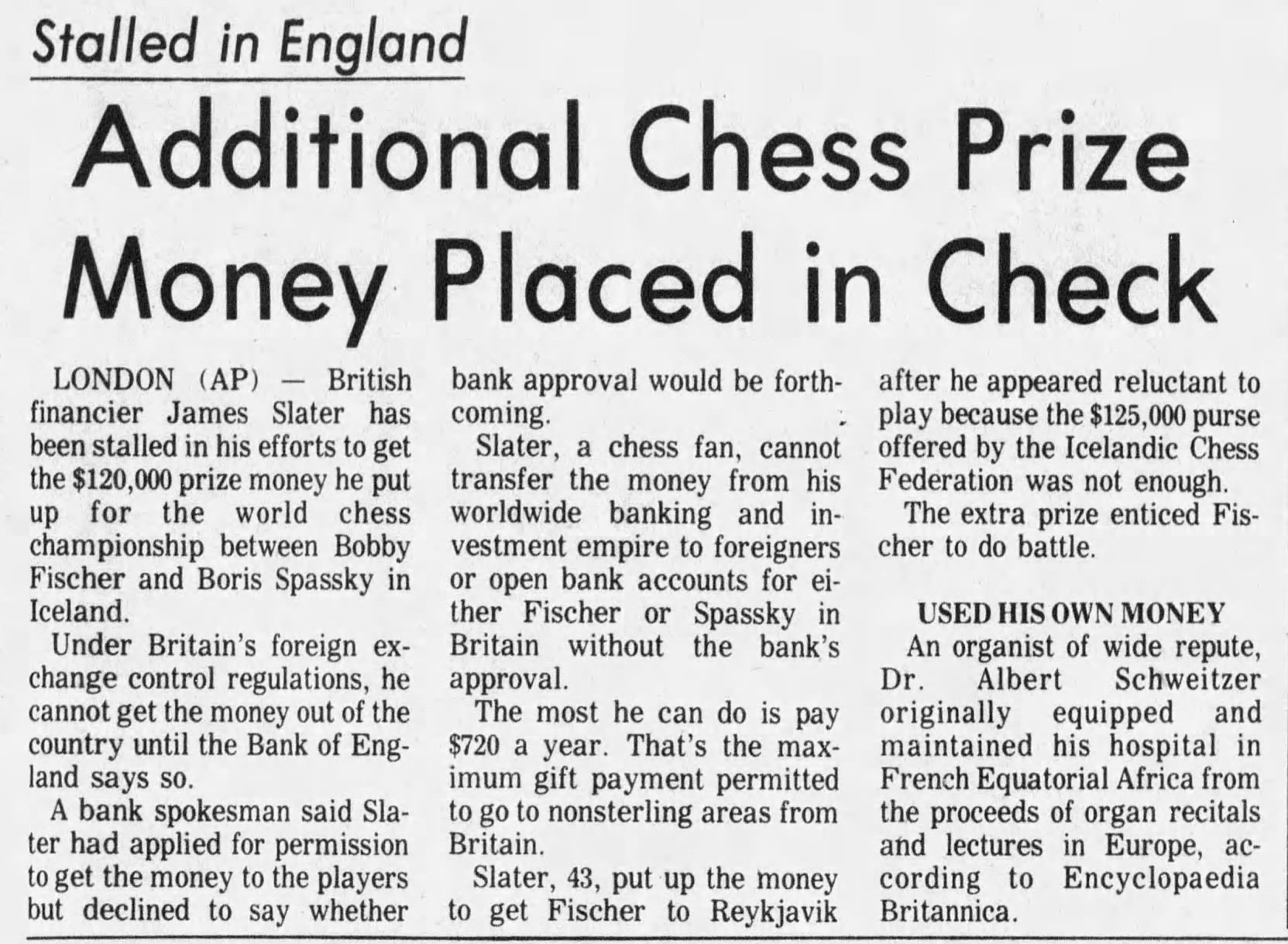 Additional Chess Prize Money Placed in Check 12 Jul 1972, Wed The Bismarck Tribune (Bismarck, North Dakota) Newspapers.com
Additional Chess Prize Money Placed in Check 12 Jul 1972, Wed The Bismarck Tribune (Bismarck, North Dakota) Newspapers.com
“…Teng said some beautiful things about the “Polar Bear” (U.S.S.R.)…I really wish…he came right out and said what Red China had been saying for years namely that the U.S.A. and the U.S.S.R. are WORKING TOGETHER for world HEGEMONY!”
- Robert Fischer, to Pal Benko, February 26, 1979
The Times-News Twin Falls, Idaho Wednesday, July 12, 1972 - Page 14
American firm buys film rights
Reykjavik (UPI) — The film and picture rights for the Boris Spassky-Bobby Fischer world chess match have been bought by an American company and all other still and film photographers are banned from the hall.
Chester Fox Inc., of New York bought the right from the Icelandic Chess Federation for an undisclosed sum of money.
The action drew strong criticism from the Icelandic press several weeks ago and a special deal was worked out enabling Iceland's five daily newspapers to buy pictures from Chester Fox Inc.
The Icelandic State Television, currently closed down for a four-week holiday, will also get free films after the first games have been played.
Cameramen and still photographers, who have no contract with the owner of the rights, will be barred from entering the hall unless they leave their cameras outside.
Above every entrance to the 3,000 seat hall, is a big sign warning spectators that cameras are forbidden inside.
NOTE: This particular news item appears simultaneously, when the racist Nixon administration is at the height of further romancing the Imperial, Atomic-Behemoth, Soviet Union with “trade agreements,” between Washington and the Industrial elite, perfuming it with overtures of giving “preferential trade” status to the Soviet Empire. Supporters in media, unwavering devotion to whichever way Nixon makes the political winds blow, newspaper editors publish outright attacks on Fischer — whilst lavishing praise and heaping bloviated glorifications upon Imperial Soviet Russia. Even making the absurd claim the “Cold War” had ended and long forgotten … “over” they said, in spite of nuclear stockpiles pointed at each other to keep the petty American and Russian people in check under the false illusions our governments were surely “protecting us” from the other. What a “simply horrible person” Fischer was for offending the imperial partners in decades of behind-the-scenes commercial world hegemony! Official sources admit the “Cold War” between the U.S. and Russian-dominated Soviet Union, did not come to its end until 1991.
The End of the Cold War
The Oshkosh Northwestern Oshkosh, Wisconsin Wednesday, July 12, 1972 - Page 13
Fischer's Brashness Admired by Milton Richman
New York (UPI) — “Do you play chess?”
“No,” said Wes Parker, first baseman for the Los Angeles Dodgers and owner of one of baseball's more active minds, “but I'm interested in the game.”
“You mean the world championship going on in Iceland now?”
“Yes, I'm following it.”
“Because of this guy Fischer?”
“He's the main reason, I suppose.”
“How do you feel about him, do you like him or not?”
“I like him.”
“Why?”
Wes Parker mulled it over awhile.
“I like him because he has —s.” said Parker, using a word which is perfectly okay in a baseball clubhouse but not in a family newspaper, a word meaning not only brass but much more, and one which describes Bobby Fischer, the pensive, seemingly strange chess genius from Brooklyn perhaps better than any other word you can think of.
Chess dates back to antiquity and has been called the most serious game played by man.
It's such a serious game and requires so much concentration, relatively few men play it. Less than 5 per cent in the United States even know the rules but an astonishingly large percentage has been begun following the game the past few weeks.
Only because of Bobby Fischer.
Here's a pale, studious, almost timid-looking 29-year-old one-time Boy Wonder who makes guys like Joe Namath and Dick Allen look like a couple of amateurs when it comes to doing his own thing, his own way and in his own good time.
The opening match in Reykjavik Tuesday was a perfect example.
Word had filtered down that Fischer was “go, go, go” for that first match with Boris Spassky, Russia's world champion.
All the embroidery had been taken care of. The drapes, the TV cameras, the light, the chess board, all the things Fischer had kicked about.
Spassky was all set.
Everyone in the Reykjavik Chess Hall was holding his breath as the Russian, playing the white pieces, made the first move, opening with the Queen pawn.
The world championship officially was on.
But something was missing.
Fischer.
He wasn't there. What was the rush? He had an hour before he had to make the first move. Fischer didn't set out to keep Spassky waiting. He didn't do it purposely. The official clock was ticking but he didn't care. Bobby Fischer ALWAYS is late. He has been late for more important things than a chess match. Even a world championship one.
And bet on it, he'll be late again. That's the way he is.
Finally, after eight minutes, during which time Spassky got up impatiently and walked around, Fischer appeared.
He shook hands with Spassky and then sat down in his special swivel chair which he had flown in from New York for these championships.
Fischer studied the board two minutes, then made his first move, knight to King bishop three.
In his own mind, Fischer feels he's one little guy taking on the whole Russian government. He doesn't feel this way because of any politics, the usual politics between countries, that is, but because of chess politics.
Regardless, he always played to win.
Tuesday's first game was adjourned, meaning each man had made his allotted 40 moves in the five-hour time limit with no decision being reached. When the game is resumed today, Spassky will have the upper hand although Fischer can still get a draw.
In this first of 24 games, Spassky played the way everybody thought he would—conservatively. That figured because if this whole business winds up even, say 12-12, Spassky goes back home to Russia the same way he came to Reykjavik—world champion.
Fischer has the first move in Thursday's second game, though.
Watch him go!
He'll play a completely different game. You can bet on that, too.
Wes Parker doesn't have to be a chess expert.
He's still got Bobby Fischer tagged perfectly.
The Times Shreveport, Louisiana Wednesday, July 12, 1972 - Page 2
Spassky Repels Fischer Assault in 1st Chess Game by Stephens Broening
Reykjavik, Iceland (AP)—Bobby Fischer made his opening assault on the Soviet chess fortress Tuesday night, but world champion Boris Spassky repelled it and left the American with a tough fight for a draw when their first game was adjourned.
The first game of history's richest world chess title match was called after 40 moves and 3 hours and 34 minutes of play. It will resume Wednesday at noon CDT, or 5 p.m. Reykjavik time.
When play was called off for the night, there was little let on the board; a king and five pawns for Fischer; a king, three pawns and a bishop for Spassky.
U.S. grandmaster Robert Byrne said: “Fischer is going to have trouble making a draw. I don't see how Spassky can lose.”
Svetozar Gligoric the Yugoslav grandmaster, commented: “It is doubtful whether black can save a draw.” Fischer is playing the black pieces and Spassky the white, which means the Russian had the first move.
Yefim Geller, the Russian who seconds Spassky, watched the final moves on closed circuit television in the corridor, sipping a cup of coffee.
“What do you think, Grandmaster Geller?” he was asked.
“I am not thinking, I am drinking coffee.” Geller replied.
Fischer has played Spassky five times in the past. The three times he played the black pieces he lost. Playing white he was able to salvage two draws, but has never triumphed over the Soviet.
Spassky made his first move Tuesday all by himself in the shadowless illumination of the stage at Reykjavik's 2,500-seat Sports palace.
There was something surrealistic about the world championship series with prize money of about $300,000 dollar starting with only one man sitting at the chess table.
Fischer, as usual, was late. He arrived seven minutes after Spassky moved his queen's pawn and referee Lothar Schmid pressed the button to start Fischer's clock.
The game went cautiously at first, with the players allotted 2½ hours each to make 40 moves. The experts said Fischer was trying for a draw by exchanging pieces, simplifying, trying to reduce the advantage Spassky had by choosing the opening.
He galloped his bishop down a long black diagonal, snatching up a Spassky pawn. In a few moves the bishop was trapped. In the exchange, Fischer lost the bishop for two pawns.
Byrne called it a blunder.
But if it was a blunder it was an attempt to inject life—and perhaps victory—into an apparently stalemated game.
The Rev. William Lombardy, a Franciscan Roman Catholic priest who acts as Fischer's second, said when the game was adjourned: “It's a difficult position to analyze.
“Since I'll have to analyze it for Bobby before the adjourned match resumes tomorrow … I probably shouldn't say more.”
The loss of his bishop was typical of the American. It was an attempt to break the game open, avoiding a standoff.
What surprised many was the cautious play in the opening and middle games by Fischer, who has a reputation for killer instinct. Experts from five countries said it appeared the challenger was trying to force a draw and a split point for the first game.
The 29-year-old American needs 12½ points to lift Spassky's crown in the 24-game match, which could spread over two months. Spassky, 35, needs only 12 points—a draw—to retain the championship, which has been in Soviet hands since 1948.
London oddsmaker rated the American the favorite to win the competition. The winner gets five-eighths of the $125,000 put up by the sponsoring Icelandic Chess Federation, or $78,125, plus $75,000 of the $120,000 contributed by London investment banker James Slater to persuade Fischer to end his holdout last week.
Organizers estimated Fischer and Spassky will divide at least another $55,000 as the players' share in the sale of television and film rights.
Before the players separated Tuesday night, Spassky wrote his 41st move on a sheet of paper, sealed it in an envelope and gave it to Schmid, the referee from West Germany.
Schmid will open the envelope Wednesday afternoon and make Spassky's first move for him.
The championship match was scheduled to begin July 2, but Gudmundur Thorarinsson's Icelandic Chess Federation played midwife to delays, arguments and threatened walkouts. When Fischer finally strode onto the stage Tuesday afternoon, Thorarinsson breathed an audible sigh of relief from his balcony seat.
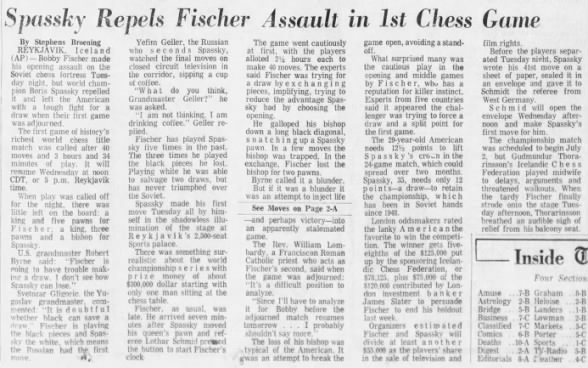 Spassky Repels Fischer Assault in 1st Chess Game 12 Jul 1972, Wed The Times (Shreveport, Louisiana) Newspapers.com
Spassky Repels Fischer Assault in 1st Chess Game 12 Jul 1972, Wed The Times (Shreveport, Louisiana) Newspapers.com
The Times Shreveport, Louisiana Wednesday, July 12, 1972 - Page 2
Boris Spassky (left) and Bobby Fischer are shown at chess table in Reykjavik, Iceland, during the first game of their battle for the world chess title. The game was adjourned after 40 moves and will resume at noon today. (AP Wirephoto by cable from Reykjavik.)
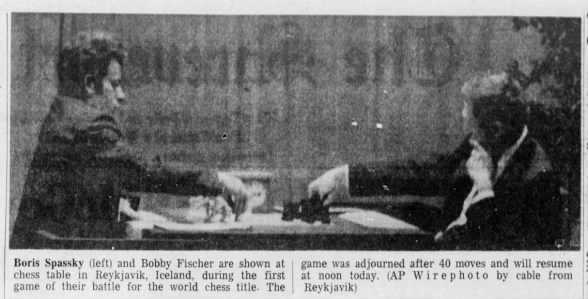 Boris Spassky (left) and Bobby Fischer 12 Jul 1972, Wed The Times (Shreveport, Louisiana) Newspapers.com
Boris Spassky (left) and Bobby Fischer 12 Jul 1972, Wed The Times (Shreveport, Louisiana) Newspapers.com
Moves in First Spassky-Fischer Chess Match
Reykjavik, Iceland (AP) Here are the moves of defending champion Boris Spassky and challenger Bobby Fischer in the opening game of their 24-game match for the world chess title.
Boris Spassky vs Robert James Fischer
Spassky - Fischer World Championship Match (1972), Reykjavik ISL, rd 1, Jul-11
Nimzo-Indian Defense: Normal Variation. Gligoric System Bernstein Defense (E56) 1-0
1. d4 Nf6 2. c4 e6 3. Nf3 d5 4. Nc3 Bb4 5. e3 O-O 6. Bd3 c5 7. O-O Nc6 8. a3 Ba5
Elapsed time: white 8 minutes black 10 minutes. The opening was a curious blend of unusual Manhattan defense with ubiquitous Nimzo-Indian.
9. Ne2 dxc4 10. Bxc4 Bb6 11. dxc5 Qxd1 12. Rxd1 Bxc5 13. b4 Be7 14. Bb2 Bd7
Elapsed time: 51 minutes white, 49 minutes black.
15. Rac1 Rfd8 16. Ned4 Nxd4 17. Nxd4 Ba4
Elapsed time; white 45 minutes, black 35 minutes.
The exchange of queens which Spassky nited on move 11 left him with only a slight advantage in the form of more harmonious development. On his 15th he took 20 minutes, obviously wondering how to reinfuse life into the game but found no way to avoid more equalizing exchanges.
18. Bb3 Bxb3 19. Nxb3 Rxd1+ 20. Rxd1 Rc8 21. Kf1 Kf8 22. Ke2 Ne4
Elapsed time: white 60 minutes, black 55 minutes.
23. Rc1 Rxc1 24. Bxc1 f6 25. Na5 Nd6 26. Kd3 Bd8 27. Nc4 Bc7 28. Nxd6 Bxd6 29. b5 Bxh2 30. g3 h5
Elapsed time: white 87 minutes, black 90 minutes.
31. Ke2 h4 32. Kf3 Ke7 33. Kg2 hxg3 34. fxg3 Bxg3 35. Kxg3 Kd6
Elapsed time: white 95 minutes, black 95 minutes.
36. a4 Kd5 37. Ba3 Ke4 38. Bc5 a6 39. b6 f5
Elapsed time: white 130 minutes, black 110 minutes.
40. Kh4 f4
Adjourned after 3 hours and 34 minutes of play.
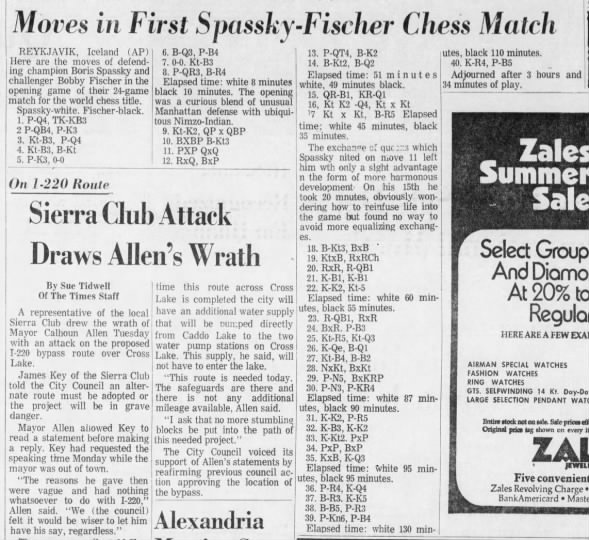 Moves in First Spassky-Fischer Chess Match 12 Jul 1972, Wed The Times (Shreveport, Louisiana) Newspapers.com
Moves in First Spassky-Fischer Chess Match 12 Jul 1972, Wed The Times (Shreveport, Louisiana) Newspapers.com
Lansing State Journal Lansing, Michigan Wednesday, July 12, 1972 - Page 14
Spassky Rated Edge by Stephens Broening
Fischer's Risky Move Changed Chess Picture
Reykjavik, Iceland (AP) — Defending champion Boris Spassky was favored by the experts to beat American challenger Bobby Fischer in the opening game of the world chess match when play resumes this afternoon.
The opener of the richest chess competition in history adjourned Tuesday night after 4 hours and 34 minutes of play and 40 moves by each player.
THE GAME was to resume at 5 p.m.—1 p.m. EDT.
Referee Lothar Schmid of West Germany will make Spassky's 41st move. The Russian wrote it on a slip of paper and handed it to him in a sealed envelope at the adjournment.
The two competitors, their seconds and chess enthusiasts throughout the world spent part of the overnight break analyzing possibilities for the 11 pieces remaining on the green-and-white chessboard in Reykjavik's sports hall: king and five pawns for Fischer; king, bishop and three pawns and a bishop for Spassky.
THE MATCH had appeared headed for a draw until Fischer tried to seize the initiative on his 29th move.
The lanky Brooklyn, N.Y., challenger galloped his bishop down a long black diagonal to snatch an unprotected pawn Spassky had offered. A few moves later the bishop was trapped and lost in exchange for two pawns.
U.S. grandmaster Robert Byrne said it was a blunder and commented, “Fischer is going to have trouble making a draw. I don't see how Spassky can lose.”
ANALYZING THE game for The Associated Press, international grandmaster Isaac Kashdan termed Fischer's move “a rare miscalculation by the American genius.” He said it gave Spassky good prospects for a win.
Svetozar Gligoric, the Yugoslav grandmaster present at the tournament, said “It is doubtful whether black can save a draw.” Spassky, who had the first move, is playing the white pieces, Fischer the black.
Fischer has played Spassky five times in the past, losing all three times he played the black pieces and getting draws both times he played the whites and had the advantage of the first move. But London bookies have made the 29-year-old American the favorite over the 35-year-old Russian in the 24-game championship.
A DRAW counts half a point and a win a point. To dethrone Spassky, Fischer needs 12½ points while the Russian can retain his crown with 12 points. The winner will get $153,125 in prize money, the loser $91,875, and in addition they will divide equally an estimated $55,000 or more from film and television sales.
The second game of the match is scheduled for Thursday and the third Sunday. The contest may last two months.
Photo Caption: Duplicate Board Shows Status of Spassky-Fischer Chess Match (UPI Photo)
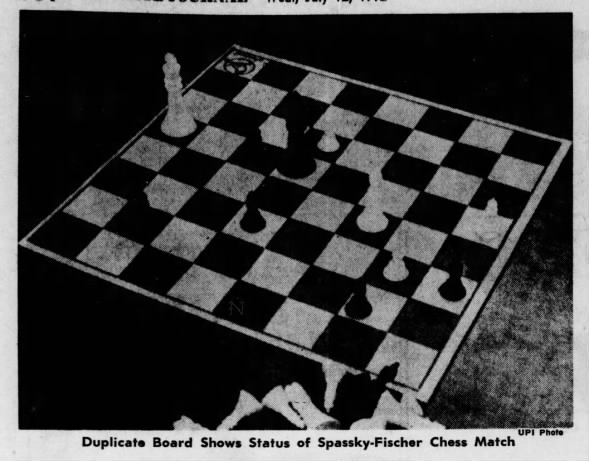 Duplicate Board Shows Status of Spassky-Fischer Chess Match 12 Jul 1972, Wed Lansing State Journal (Lansing, Michigan) Newspapers.com
Duplicate Board Shows Status of Spassky-Fischer Chess Match 12 Jul 1972, Wed Lansing State Journal (Lansing, Michigan) Newspapers.com
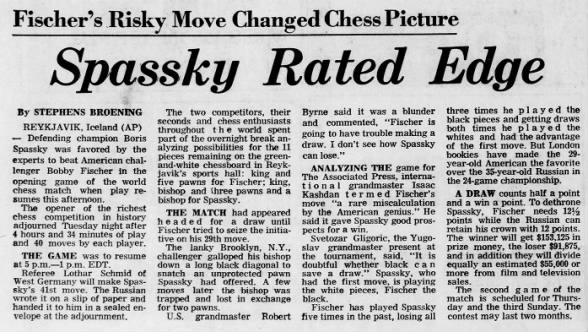 Spassky Rated Edge 12 Jul 1972, Wed Lansing State Journal (Lansing, Michigan) Newspapers.com
Spassky Rated Edge 12 Jul 1972, Wed Lansing State Journal (Lansing, Michigan) Newspapers.com
The Spokesman-Review Spokane, Washington Wednesday, July 12, 1972 Page 8
Quiet In Russia
Moscow (AP)—Moscow's Central Chess Club, usually buzzing with kibitzers for big chess matches, was quiet Thursday night as the Soviet Union's Boris Spassky began defense of his world title against America's Bobby Fischer.
No arrangements had been made to get a move-by-move report on the match in far-off Reykjavik, Iceland. Soviet grandmasters, masters and millions of ordinary chess fans were waiting until today for an account of the play.
For the all-Soviet championships of the past, the club on tree-lined Gogloevsky Boulevard has been a lively center of commentary and attention to the match in progress. As each move was made at the championship it was relayed to the club for the benefit of members and fans waiting there.
Although Western news agencies were carrying reports of the play, the Soviet news agency Tass ran no listing of the move-by-move action during the first three hours of play. By 11 p.m. the final television news commentator read a list of the first 20 or so moves.
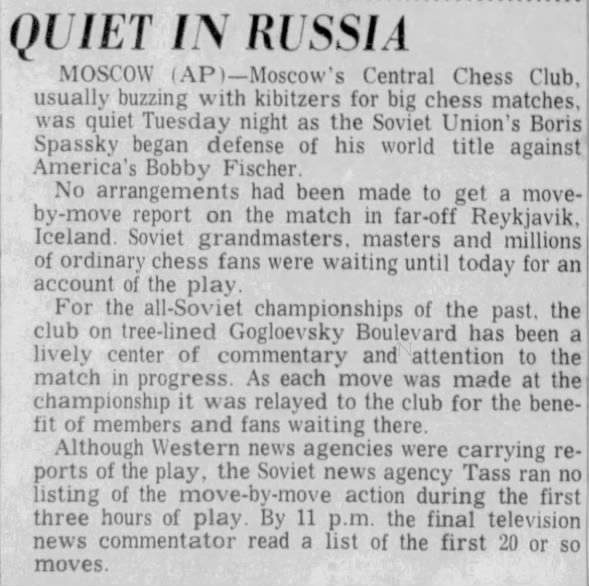 Quiet In Russia 12 Jul 1972, Wed The Spokesman-Review (Spokane, Washington) Newspapers.com
Quiet In Russia 12 Jul 1972, Wed The Spokesman-Review (Spokane, Washington) Newspapers.com
The Press Democrat Santa Rosa, California Wednesday, July 12, 1972 - Page 12
Russian Spassky Favored in First Match
Reykjavik, Iceland (UPI) — Caught in a hopelessly drawn game, American challenger Bobby Fischer took a chance to bring some life into his first world chess championship game.
In that moment, Boris Spassky proved why he is the world champion in the noblest of games.
He immediately pounced on Fischer's bishop—left trapped after capturing one of the Russian's pawns—and the game turned distinctly in Spassky's favor.
Spassky asked for adjournment after 40 moves and 4½ hours play.
When the two resume the game — the first in their $250,000, 24-game world match — Spassky has a bishop and three pawns against Fischer's five pawns. Play resumes at 5 p.m. (1 p.m. EDT).
Most experts assembled here seemed to agree that Spassky has a chance to win, while Fischer should be happy if he salvages a draw.
But nobody has come up with an explanation why the American chess genius went straight into what appeared to be a Russian trap.
“He took a chance to win a chance,” said Danish grandmaster Jens Eneveoldsen.
“We will never know until Fischer tells us—if he does,” said another international grandmaster.
Fischer obviously was displeased with his game. After the adjournment he angrily demanded a meeting with the Icelandic organizers to complain against what he described as the noisy audience. Some 3,000 Icelanders and foreign chess enthusiasts had packed into the Lagardur Hall for the opening thriller. But most knowledgeable observers ([“knowledgeable” as in the choice of a bitterly Anti-American location which absolutely restricts persons of the black race entry into Iceland. Therefore, logically one can conclude their opinions are undoubtedly equally prejudicial and biased across the board]) said they felt the audience was more quiet than is normal at top chess games. ([Sure they did. Similar to the argument fallacies later utilized by the Soviet and Chester Fox. When Fischer complains of “noisy cameras”, the biased reports mention nothing of the noisy men operating the cameras, but mislead readers thousands of miles away, to believe the “cameras were tested with sound equipment” as their evidence the “cameras are completely silent,” and Fischer is supposedly “imagining” his complaint about noisy camera men hired by the Soviet liaison Chester Fox.])
The Icelanders rejected Fischer's demand and told him it is up to the official referee, Lothar Schmid of West Germany, to run the game from now on.
Spassky's seconds, including international grand masters Efim Geller and Nikolai Krogius, sent their world champion to sleep and then spent the night and the morning hours analyzing the position to find a winning combination for Spassky.
Many experts feel they will succeed, even if Geller himself modestly suggested: “I believe we will have a draw.”
The first game started with Fischer being late eight minutes because he had been delayed by traffic.
The Sacramento Bee Sacramento, California Wednesday, July 12, 1972 - Page 13
Fischer Concedes: Spassky Takes First Game In Title Series
Reykjavik, Iceland (AP) — World champion Boris Spassky won the first game Wednesday in his world title chess series against American Bobby Fischer.
Fischer, in a hopeless position, resigned. He stood up, folded his score sheet and walked out of the Reykjavik sports palace.
The decision confirmed the judgment of the experts who considered Fischer was in a difficult position when the game was adjourned after 40 moves Tuesday night.
The victory gave Spassky a 1-0 lead in the 24-game match and an important psychological advantage. Fischer has never beaten Spassky. His winless streak against the Russian now stands at six games.
With Bobby Fischer struggling to escape with a draw, Spassky resumed play Wednesday night in their adjourned first game, further reducing Fischer's forces with a pawn exchange.
The opening game of the world championship was adjourned Tuesday night after 40 moves.
Fischer and the defending champion from Russia left the table with the American in a difficult position.
Spassky's 41st move was written on a slip of paper, put in a sealed envelop at the close of play Tuesday night and given to Chief Referee Lothar Schmid of West Germany.
Schmid ceremoniously opened the envelope at 5 p.m., 1 p.m.
After five minutes of play and several indecisive moves by both men, Fischer popped up, spoke animatedly to Schmid and stalked offstage.
Schmid followed him off.
Fred Cramer, a U.S. Chess Federation official who went backstage to talk to Fischer, said the American had complained about the presence of move cameras in the back of the hall. They were about 150 feet away and seemed inaudible from where Fischer sat.
Fischer's walkout lasted about half an hour.
When play was called off last night, there was little left on the board: a king and five pawns for Fischer; a king, three pawns and a bishop for Spassky.
Fischer Late
Spassky made his first move Tuesday all by himself in the shadowless illumination of the stage at Reykjavik's 2,500-seat Sports palace.
There was something surrealistic about the world championship series with prize money of about $300,000 starting with only one man sitting at the chess table.
Fischer, as usual, was late. He arrived seven minutes after Spassky moved his queen's pawn and referee Lothar Schmid pressed the button to start Fischer's clock.
Fischer, dressed in a dark suit, leaned forward with his head propped on his fist during the game, or rocked back in his swivel chair to get a longer view of the forces silently colliding on the marble and slate chess board.
Spassky Was Comfortable
Spassky seemed more comfortable with his forearms on the padded edge of the table. His legs were bent back under his chair, toes downward.
A large neon sign blinked on occasionally to admonish “silence.” Its purpose was to hush a low murmur in the vast audience.
Spectators sat in near darkness, most of them too far away to make out what was happening onstage. But above and in front of the stage, a screen 30 feet across displayed the positions on the board.
Photo Caption: Bobby Fischer studies the chess board before making a move. AP Wirephoto.
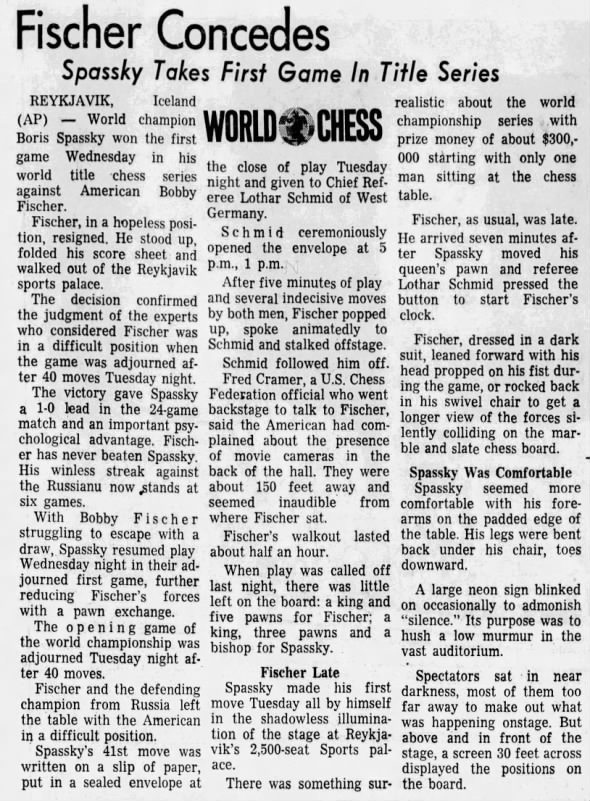 Fischer Concedes: Spassky Takes First Game In Title Series 12 Jul 1972, Wed The Sacramento Bee (Sacramento, California) Newspapers.com
Fischer Concedes: Spassky Takes First Game In Title Series 12 Jul 1972, Wed The Sacramento Bee (Sacramento, California) Newspapers.com
Press and Sun-Bulletin Binghamton, New York Wednesday, July 12, 1972 - Page 12
Immersed — Concentrating, Brooklyn's Bobby Fischer studies the chessboard Tuesday while Soviet opponent Boris Spassky, left, awaits his move. The first game of 24 in the world chess title match, was continued this afternoon.
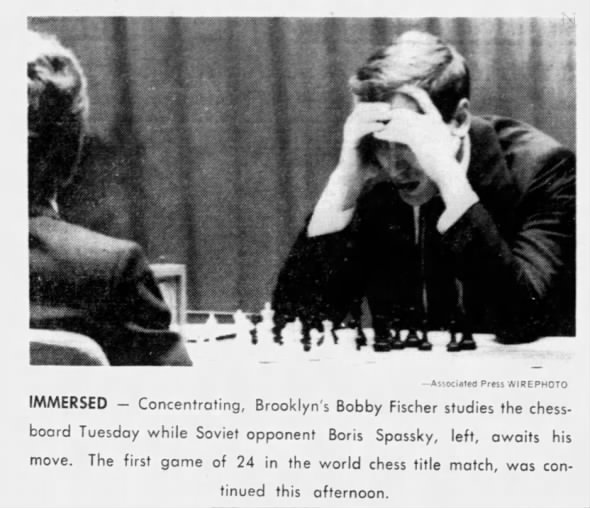 Immersed 12 Jul 1972, Wed Press and Sun-Bulletin (Binghamton, New York) Newspapers.com
Immersed 12 Jul 1972, Wed Press and Sun-Bulletin (Binghamton, New York) Newspapers.com
The Bismarck Tribune Bismarck, North Dakota Wednesday, July 12, 1972 - Page 2
Spassky Wins Opener: Fischer Pulls Chess Blunder
Reykjavik, Iceland (AP) — World champion Boris Spassky won the first game Wednesday in his world title chess series against American Bobby Fischer.
Fischer, in a hopeless position, resigned. He stood up, folded his score sheet and walked out of the Reykjavik sports palace.
The decision confirmed the judgment of the experts who considered Fischer was in a difficult position when the game was adjourned after 40 moves Tuesday night.
The victory gave Spassky a 1-0 lead in the 24-game match and an important psychological advantage. Fischer never has been Spassky. His winless streak against the Russian now stands at six games.
The opening game of the world championship was adjourned Tuesday night after 40 moves.
Fischer and the defending champion from Russia left the table with the American in a difficult position.
As a difficult end-game commenced, Fischer had a king and four pawns left, Spassky a king, two pawns and a bishop.
The two competitors, their seconds and chess enthusiasts throughout the world spent part of the overnight break analyzing possibilities for the 11 pieces remaining on the green-and-white chessboard in Reykjavik's sports hall: king and five pawns for Fischer; king, bishop and three pawns for Spassky.
The match had appeared headed for a draw until Fischer tried to seize the initiative on his 29th move.
The lanky Brooklyn, N.Y., challenger galloped his bishop down a long black diagonal to snatch an unprotected pawn Spassky had offered.
The Province Vancouver, British Columbia, Canada Wednesday, July 12, 1972 - Page 2
It's Spassky's Move
Here are the moves of Spassky and Fischer in the opening game of their 24-game match, Spassky-white, Fischer-black.
Messenger-Inquirer Owensboro, Kentucky Wednesday, July 12, 1972 - Page 10
A Hand Shake Between Boris Spassky (left) and Bobby Fischer came seven minutes after Spassky made the first move to open the World Chess Championships in Reykjavik, Iceland, Tuesday. Fischer, arrived late for the match due to being held up in traffic because the Icelandic Chess Federation was failing to deliver on its promise of offering official police protection. This is the SECOND of such reports of Icelandic police failure, which have made its way to western newspapers. The first incident occurred the night of the official opening and drawing of colors. Fischer then, arrived, reportedly with his suit rumpled from being accosted by a mob of fans, waiting for his arrival and police failed to protect him. (AP Wirephoto)
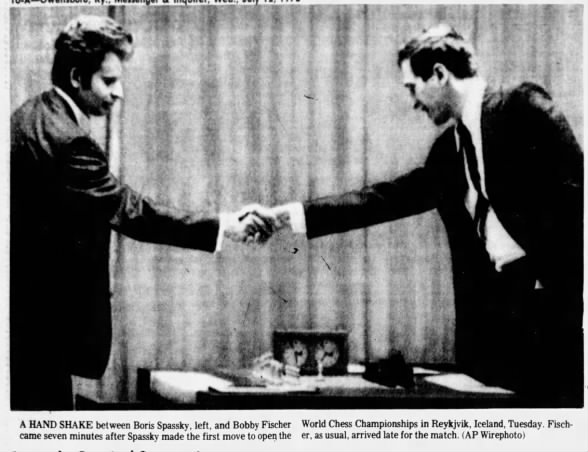 A Hand Shake Between Boris Spassky (left) and Bobby Fischer 12 Jul 1972, Wed Messenger-Inquirer (Owensboro, Kentucky) Newspapers.com
A Hand Shake Between Boris Spassky (left) and Bobby Fischer 12 Jul 1972, Wed Messenger-Inquirer (Owensboro, Kentucky) Newspapers.com
The Philadelphia Inquirer Philadelphia, Pennsylvania Wednesday, July 12, 1972 - Page 23
He's Only A Pawn But He Takes Up Fischer's Lead by Jeremy Heymsfeld
“So you want to learn about chess.
“What do you know about it?”
“Nothing.”
“Oh.”
Leroy Dubeck, associate professor of physics at Temple University, president of the U.S. Chess Federation and 36th-ranked player in this country, sighed. He had hoped to eat a quiet lunch at his Cherry Hill home contemplating the world championship which finally opened yesterday in Reykjavik, Iceland.
“You know, I learned this game when I was 10, maybe 11,” he said staring at the 32-year-old novice. “But I guess you could pick it up.”
DUBECK THEN put 32 pieces — 16 on a side — on the 64-square inlaid board and proceeded with a 20-minute explanation of the rudiments of chess.
He noted that each side has 8 pawns, 2 bishops, 2 rooks, 2 knights, a queen and a king. Each of the pieces has its limitations.
“The pawns are good soldiers,” Dubeck said. “They can only move forward and on the first move they can go one or two squares.”
The king can move in any direction to a square adjacent to him; bishops can move any number of spaces—forward or back—but only diagonally; rooks also can move any number of spaces but only forward, back or to the sides.
THE QUEEN has the prerogatives of both the bishop and the rook. The knight, the only piece that can jump over an opponent, makes L-shaped moves, two in any one direction and one at right angles.
The king cannot move to a square controlled by an opponent's piece. The object of the game is to “check” the king — prevent him from moving.
“That's it,” concluded Dubeck. “Once you master the moves, you can play. But to really play you have to coordinate everything, to think ahead…”
Dubeck, a quiet, scholarly type, exulted in the behavior of Bobby Fischer which preceded the opening of the world championship match.
“He (Fischer) took chess off the back pages and put it on page one. He stirred a great deal of interest in chess.
“He's the reason you're here, isn't it?”
Hartford Courant Hartford, Connecticut Wednesday, July 12, 1972 - Page 65
Spassky, Fischer Adjourn Chess Match to Today
Reykjavik, Iceland (UPI)— World champion Boris Spassky of the Soviet Union capitalized on an error by U.S. Grand Master Bobby Fischer and gave him only hope for a draw Tuesday night when the opening game of the world championship chess match was adjourned after 4½ hours of play.
The adjournment until 5 p.m. (1 p.m. EDT) today came after 40 moves off the first game of the 24-game match and gave Spassky, 35, who was playing white, a slight advantage with a bishop and three pawns. Fischer, 29, had five pawns on the board.
Fischer appeared calm when he arrived eight minutes after the start of the $250,000 match and was welcomed by the capacity crowd of 3,000 with a 30-second ovation. But as the game progressed, Fischer appeared angry with himself.
When the game was adjourned with one-half hour of playing time remaining, Fischer's second, Father William Lombardy, said “Bobby is fighting for a draw.”
But Robert Byrne, another U.S. grand master, said “Fischer is in trouble and he might lose.”
Fischer apparently erred on the 29th move when he took Spassky's king rook pawn and got his bishop trapped in the process. The Russian lost another pawn before taking Fischer's bishop off the board.
Some experts described the move as an attempt by the American to inject some life into a rather dull game. But the general opinion seemed to be that Fischer went into a simple trap.
The Palm Beach Post West Palm Beach, Florida Wednesday, July 12, 1972 - Page 23
‘I Saw Greatness in Him’ By Bill Schnitt, Post Staff Writer
Fischer's Former Teacher Rooting for Pupil
Carmine D. Nigro, a retiree living in West Palm Beach, predicts his former chess pupil Bobby Fischer will wrest the world chess championship from Russian Boris Spassky.
“Bobby's a genius — there's no question about it,” says Nigro. “He's the greatest player that ever lived.”
Nigro predicts Fischer will rout Spassky 12½ points to 9½ points.
“Bobby has worked hard at it, and I hope he wins. I wish him the best,” says Nigro, a resident of Century Village.
Fischer's 97-page book entitled “Bobby Fischer's Games of Chess” is dedicated “To my chess teacher, Carmine Nigro.”
In the book's introduction, Fischer cites Nigro as “possibly no the best player in the world, but he was a very good teacher. I went to the Brooklyn Chess Club practically every Friday night. Later I started playing chess at Mr. Nigro's home on weekends and often went with him to play chess at Washington Square park.”
Nigro, a New York bandleader who played under the name “Tommy Little,” took an interest in 8-year-old Fischer when he saw him in an international tournament in January 1951. Fischer was beaten soundly and Nigro invited him to join the Brooklyn Chess Club.
“At that time, Bobby didn't play very well. But I saw greatness in him. He loved chess. He played it 24 hours a day,” recalls Nigro.
Even then, the brash youngster was known as a loner.
“He couldn't make friends — nobody liked him or would play chess with him. His mind was always on chess. Every time he went to sleep, he thought of chess, or had a chess book in his hands.” said Nigro.
For two years, Nigro tutored Fischer constantly. There were sessions after school, and each Saturday and Sunday, Nigro gave seven-hour lessons.
“Bobby's mother was a nurse. She gave Bobby one dollar for his lesson and a dollar to eat with.”
“Bobby ate like a horse. He'd eat two steaks, three pie ala mode and three glasses of milk,” says Nigro. “He was just a fabulous eater.”
At one time, Bobby's mother tried to interest her son in music as a diversion from chess.
“I gave Bobby several accordion lessons, but he wouldn't practice and he gave it up. He loved chess too much.”
Nigro isn't surprised at Fischer's dispute with chess officials over money.
“It's all psychological warfare,” says Nigro. “It's a battle of nerves. I really didn't teach him that — he learned it at the Brooklyn Chess Club.”
Nigro hasn't heard from Fischer in years, and he's not surprised.
“It's impossible to get in touch with Bobby,” says Nigro. “You just can't write to him. He won't write back. He stays by himself.”
In the meantime, Nigro is rooting hard for Fischer.
“The Russians have dominated chess and they somehow look at other chess players as uncouth. Bobby is trying to do something for chess and the American chess player.” says Nigro.
Caption: Chessman Carmine Nigro…recalls experiences with young Bobby. Staff Photo by Aida Smith
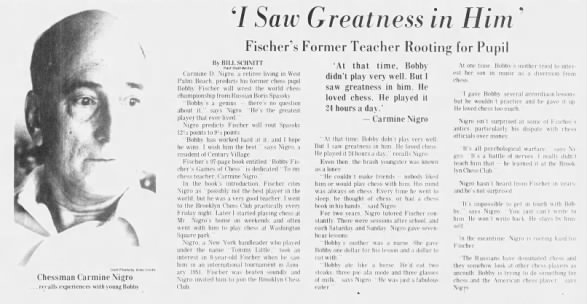 'I Saw Greatness in Him' 12 Jul 1972, Wed The Palm Beach Post (West Palm Beach, Florida) Newspapers.com
'I Saw Greatness in Him' 12 Jul 1972, Wed The Palm Beach Post (West Palm Beach, Florida) Newspapers.com
The Arizona Republic Phoenix, Arizona Wednesday, July 12, 1972 - Page 4
Russian Gets Chess Jump on American
(UPI) Reykjavik, Iceland — World champion Boris Spassky of the Soviet Union capitalized on an error by U.S. grand master Bobby Fischer and gave only hope for a draw tonight when the opening game of the world championship chess match was adjourned after 4½ hours of play.
The adjournment until this afternoon came after 40 moves of the first game of the 24-game match and gave Spassky, 35, who was playing white, a slight advantage with a bishop and three pawns. Fischer, 29, had five pawns on the board.
Fischer appeared calm when he arrived eight minutes after the start of the $250,000 match and was welcomed by the capacity crowd of 3,000 with a 30-second ovation. But as the game progressed, Fischer appeared angry with himself.
When the game was adjourned with one-half hour of playing time remaining, Fischer's second, the Rev. William Lombardy, said, “Bobby is fighting for a draw.”
But Robert Byrne, another U.S. grand master, said “Fischer is in trouble and he might lose.”
Fischer apparently erred on the 29th move when he took Spassky's king rook pawn and got his bishop trapped in the process. The Russian lost another pawn before taking Fischer's bishop off the board.
Some experts described the move as an attempt by the American to inject some life into a rather dull game. But the general opinion seemed to be that Fischer went into a simple trap.
Fischer also appeared to be playing for a draw from the start—quite unlike his normal aggressive tactics—possibly arguing that a draw playing the black pieces, or defense, would give him a chance in the second game when he plays white and has the initiative from the start.
From their first moves, both contenders played briskly, trading queens in the 11th and 12th moves but taking no advantage through even the 20th move.
The game began precisely on time, but Fischer did not appear for several suspense-filled minutes.
Fischer shook Spassky's hand, quickly sat down and took two minutes to respond to the champion's opening queen gambit by choosing the Nimzo-Indian defense.
The American broke Spassky's mobilization of heavy pieces in the 14th move but later in the game erred by sacrificing his last bishop against two pawns.
Father Lombardy said the American meant no slight to Spassky by arriving late.
“The traffic was just a bit more heavy than we had expected and we arrived at the hall only a few minutes before match time,” Lombardy said.
Early in the game, Fischer went over to the arbiter a couple of times and appeared to be objecting to a huge sign in blue, white and red showing the International Chess Federation emblem and the name of the Icelandic Chess Federation. The sign decorated the stage where the two players sat alone with the arbiter and his deputy.
Fischer only left the table twice to drink some orange juice. He first complained it was not cold enough but was satisfied when ice cubes were produced.
Spassky spent much of his waiting time walking about the stage and disappearing to the restrooms behind.
Neither player ran into time trouble and Fischer's late arrival did not appear to have affected him badly.
By the time the American challenger sat down at the chess board on stage in a 3,000-seat auditorium, the deputy arbiter of the match already had started the game's timing clock and Spassky had made his opening move.
Each player is allowed to be up to one hour late for scheduled openings of games in international competition, so Fischer actually had 50 minutes to spare in making his first move. Each player must complete 40 moves within 2½ hours after the game begins.
By the end of the 30th move, Fischer had a pawn advantage in pieces but the challenger had moved his remaining bishop into Spassky's king rook's corner and the Soviet champion trapped it there, rendering it useless.
The match, being played for a $250,000 purse as well as the world title, already has been delayed twice from its originally scheduled starting date of July 2. The winner will receive $150,000, the loser $100,000. Both will share in revenue from television rights.
Fischer, 29, of Brooklyn, N.Y., did not show up in time for the original starting date nine days ago, remaining in New York in an unsuccessful attempt to force the Icelandic organizers of the match to add a percentage of the gate to the original $125,000 purse and 30 per cent of the television rights.
Fischer, who had beaten three international grand masters in order to qualify as Spassky's opponent for the title, agreed to come to Reykjavik only after a British banker doubled the purse with a personal contribution of $125,000. Then Spassky demanded a personal apology from Fischer for the delay. The American gave it to him in a letter delivered during the weekend.
Caption: Boris Spassky, left, and Bobby Fischer concentrate over chess table at first game for world chess title. (Associated Press).
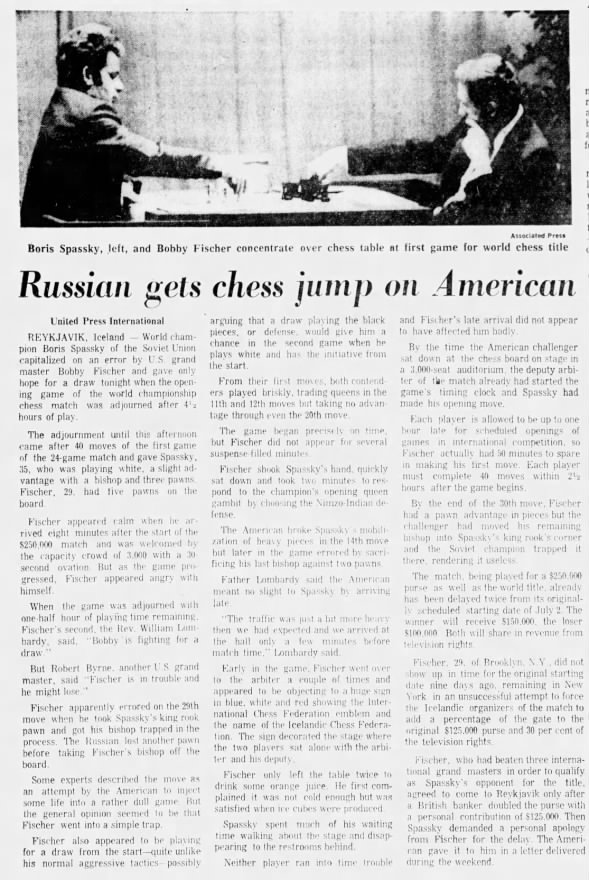 Russian Gets Chess Jump on American 12 Jul 1972, Wed Arizona Republic (Phoenix, Arizona) Newspapers.com
Russian Gets Chess Jump on American 12 Jul 1972, Wed Arizona Republic (Phoenix, Arizona) Newspapers.com
The Baltimore Sun Baltimore, Maryland Wednesday, July 12, 1972 - Page 2
Spassky, Fischer Adjourn Championship Chess Match
Expert says Spassky Has Better Position by Isaac Kashdan
Los Angeles (AP) — The Soviet titleholder, Boris Spassky, has good prospects for a win in the first game of his world championship chess match with Bobby Fischer.
After 40 moves and five hours of play, Mr. Spassky is a bishop ahead. The American challenger has five pawns to Mr. Spassky's three and his king is better placed. This may prove to be sufficient compensation.
Actually, for the first 28 moves, the match was one of the dullest championship contests on record.
For the first nine moves, the game was identical to one played in 1951 between Petrosian and Tolush of the Soviet Union.
Two moves later, the queens were exchanged, and the pawn formation was left in exact balance. More pieces soon went off the board, including all the rooks by the 23d move. At that point, it seemed only a question of time before one of the players would propose a draw and the other would accept. The chance of error was not worthy of consideration with players of this stature.
But it happened. On his 29th turn, Mr. Fischer took a pawn that was unprotected. Both players knew that the bishop which captured the pawn could be trapped. What had Mr. Fischer seen?
It must be put down to a rare miscalculation by the American genius. Perhaps he had thought of a resource by 32. … P-R6, when the bishop might escape.
But Mr. Spassky could then continue 33. K-N4, B-N8; 34. KxP BxP; 35. B-Q2, and the black bishop is still lost.
In the remaining moves of the session, Mr. Fischer put up all the resistance possible. It remains to be seen whether he can recover from the one error.
The Philadelphia Inquirer Philadelphia, Pennsylvania Wednesday, July 12, 1972 - Page 26
Money-Grubber or No, Fischer Is a Chess Genius by J.A. Livingston, Inquirer Economics Columnist
“Product of a money-grubbing society.”
That's how a Soviet editor characterized Bobby Fischer for his failure to appear on time for his chess match with Boris Spassky.
Inference: ([Soviet-Bolshevism]) “Communism(TM)” is beautiful, capitalism is degrading— it destroys human beings.
But does it?
True, Bobby Fischer is a product of American society, as are Richard M. Nixon, Joe Frazier, Muhammad Ali, James A. Michener, Gloria Steinem, Martha Mitchell, George McGovern, James Baldwin, Jacqueline Kennedy Onassis, and Portnoy's Complaint.
But Bobby, like Portnoy, is not an American prototype. He's an adolescent at 29. Perhaps that's why he's usually referred to as Bobby.
IN THE UNITED STATES, he has been accepted because of his chess genius. But in Moscow, Theodore Shabad of the New York Times was told that “Russian public opinion would never stand” for his behavior.
That's the difference between diversity and authoritarianism. Between capitalism with its multiplicity of employers and ([Soviet-Bolshevik])“Communism(TM)” with a single employer — the ruling few from whom all dachas flow.
In the Soviet Union, if you aspire to a comfortable home with private kitchen and bath and emoluments such as an automobile, it's well to be a member of the ([Soviet-Bolshevik]) party.
But the party is not open to all. Men (11,300,000) are preferred over women (3,300,000); city dwellers over farmers; white-collar workers over blue-collar workers. Only about 14,600,000 adults have made it out of 160,000,000.
If you don't happen to be one of the chosen, then you'd better be an extraordinary person — a brilliant bureaucrat, a musician, a scientist, a nuclear physicist, a prominent journalist, a factory executive, a famous athlete. Only recently was Spassky awarded better living quarters.
Yet, an exceptional person can't be too exceptional. He must adhere to the Party line. Because Alexander Solzhenitsyn writes about the hardships of Soviet life instead of glorifying Leninism-Marxism-([BOLSHEVISM])Communism([TM]), he has been read out of the Writers' Union and criticized for winning the Nobel prize. He lives as an excommunicant — a genius denied publication in his own country.
THAT'S THE TRAGEDY of a single-entry system — The State Over Everybody. Big Brother controls all jobs. And deviation from Big Brother's rules begets the blacklist.
The French political commentator, Jean-Francois Revel, in his book “Without Marx or Jesus — The New American Revolution Has Begun,” defends the United States, thus:
“I am unable to explain why Europe, and not America, has been blessed with Hitler, Mussolini, the Moscow Trials, concentration camps, Petainism,Francoism, racial persecution, the Gestapo, the G.P.U.…Why is it that the United States has always been able to preserve its democratic institutions and avoid fascism? And why is it that totalitarian regimes … occupy most of European territory today?”
The answer is that a money-grubbing society gives people mobility, choice, and economic latitude. It's a double-entry system. A man or woman can make a livelihood in government as an elected official or as a federal, state, or local government employee.
Or he can bustle in the private economy as a doctor, lawyer, professor, or as an employee among millions of employers—small stores, large stores, little factories, big factories, foundations, banks, insurance companies, colleges, publishing houses, and so on — each independent in its own way.
In America, businessmen would decide whether to publish or let Solhenitsyn perish. Their rivalry for profits and prestige would override ideology and government protests, if any.
This doesn't exculpate Bobby Fischer for misbehavior ([and why should Bobby Fischer need exculpating when he was reacting to Soviet misbehavior, the capitalist newspapers failed for whatever strange reason to give national news-worthy coverage; earlier months on, the many, finicky, overbearing demands and complaints of European/Soviet organizers who refused for months to sort out the arrangements, before match. Refusing to confer with Fischer, man to man. Soviet-orchestrated-Belgrade Chess organizers' ILLEGAL demand of $35,000 USD “guarantee” rebuffed by USCF! Australia's LEGAL $225,000 bid snubbed by the Soviet USSR, threatening FIDE, the Soviet champion “would not play” if Euwe kept his word and gave the first half of matches to Australia or Mexico, coming in with its bid at $175,000! USSR selection of the notoriously Anti-American, Racist Iceland which restricted entry of persons of color, and due to lack of modern satellite-communications technology, restricted world news coverage for the match. Schemes underfoot by what Ken Smith referred to as “old hands” in Reykjavik/Belgrade to maneuver the means to disqualify Fischer and replace with a Soviet, namely, Petrosian, et cetera, etc.]) It's not a plea for “money-grubbing.” It is a description of the socio-economic tolerance of capitalistic diversity. And if that's called money-grubbing, we should make more of it.
 Money-Grubber or No, Fischer Is a Chess Genius 12 Jul 1972, Wed The Philadelphia Inquirer (Philadelphia, Pennsylvania) Newspapers.com
Money-Grubber or No, Fischer Is a Chess Genius 12 Jul 1972, Wed The Philadelphia Inquirer (Philadelphia, Pennsylvania) Newspapers.com
Newsday (Nassau Edition) Hempstead, New York Wednesday, July 12, 1972 - Page 85
An Analysis
Since Fischer is known for his predilection for the Grunfeld Defense, it was a little surprising that he drifted into the Nimzo-Indian opening. Maybe he feared use of the Grunfeld again after his loss to the world champion at the Siegen Olympiad in Germany in 1970.
At first the experiment appeared rewarding at least as far as the draw was concerned.
Early exchange of the queens was followed first by the exchange of minor and then by the exchange of major pieces, so that very rapidly the game came down to a level bishop-and-pawn ending.
Surely this was going to be a draw, we all thought. Suddenly, there came a most astonishing twist to the game. Against all expectations, Fischer captured a rook pawn with his bishop and doomed the bishop to destruction. Could the grandmaster have overlooked something or had he seen deeper than the rest of us?
The only real winning chance for white lies in getting the king back so as to prevent Fischer's pawns from advancing. Once this is done, black is entirely without winning prospects. But it is not clear how white can make further progress. It is upon this problem, no doubt, that the Russian grandmaster will pass the night in analysis.
Harry Golombek, an international chess grandmaster, has been three times British chess champion and a judge in six previous world chess championship matches. He is chess correspondent for the Times of London.
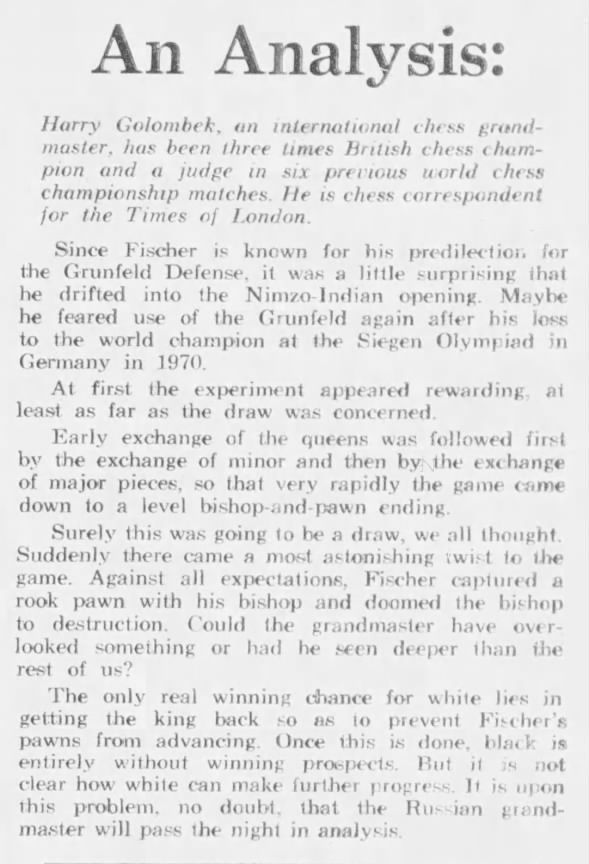 An Analyses 12 Jul 1972, Wed Newsday (Nassau Edition) (Hempstead, New York) Newspapers.com
An Analyses 12 Jul 1972, Wed Newsday (Nassau Edition) (Hempstead, New York) Newspapers.com
Newsday (Nassau Edition) Hempstead, New York Wednesday, July 12, 1972 - Page 85
Board at Adjournment in First Chess Clash
When the players adjourned after 40 moves each, this was the view from Fischer's side; A king and five pawns (black) against Spassky's king, three pawns and a bishop (white). UPI Photo.
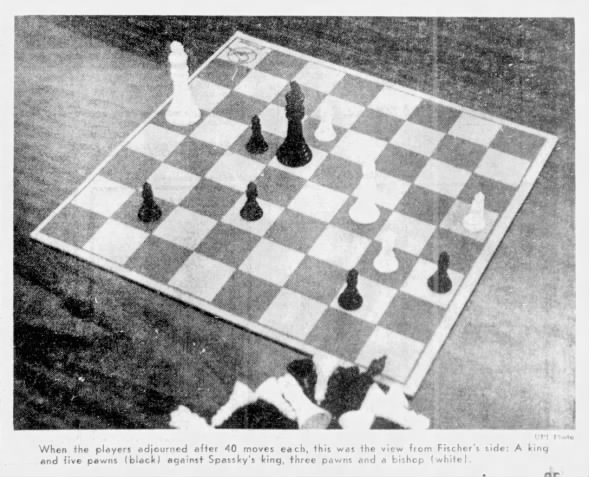 View After Adjournment in First Chess Clash 12 Jul 1972, Wed Newsday (Nassau Edition) (Hempstead, New York) Newspapers.com
View After Adjournment in First Chess Clash 12 Jul 1972, Wed Newsday (Nassau Edition) (Hempstead, New York) Newspapers.com
Newsday (Nassau Edition) Hempstead, New York Wednesday, July 12, 1972 - Page 85
First Game: It Looks Like Spassky's
Reykjavik, Iceland (AP)—Bobby Fischer made his opening assault on the Soviet chess fortress last night, but world champion Boris Spassky repelled it and held the only chance of victory after 3½ hours' play when the first match was adjourned until today.
Fischer, who arrived eight minutes after the start of the game, could only hope to settle for a draw after losing his last bishop for two pawns. Spassky still had a bishop and three pawns to Fischer's five pawns when the two adjourned after 40 moves. The game was to resume at 1 p.m. EDT.
U.S. grandmaster Robert Byrne said: “Fischer is going to have trouble making a draw. I don't see how Spassky can lose.” Svetozar Gligoric, the Yugoslav grandmaster, commented: “It is doubtful whether black can save a draw.” Fischer is playing the black pieces and Spassky the white, which means the Russian had the first move.
Fischer has played Spassky five times in the past. The three times he played the black pieces he lost. Playing white he was able to salvage two draws, but has never triumphed over the Russian.
Spassky was up at 8:30 this morning and waited for the rain to stop so he could get in his daily set of tennis. Fischer was reported still asleep at noon.
Discussing the game with newsmen, Spassky said: “When you are playing a man like Fischer, you have to watch all the time.” Asked if he watched the whole board when he played, Spassky said “No, I watch two or three pieces where the effort is concentrated.”
Spassky made his first move yesterday all by himself in the shadowless illumination of the stage at Reykjavik's 2,500-seat Sports palace. There was something surrealistic about the world championship series, with prize money of about $300,000, starting with only one man sitting at the chess table.
Fischer was late. He arrived eight minutes after Spassky ([due to being held up in traffic but the reporter didn't seem to feel that actual facts were important to pass along to American readers. And, if the Icelandic police had been available to properly clear traffic as is customary with so-called “police protection” Fischer would have arrived on time, as police are supposed to know, in advance about fluctuations in traffic congestion]) had moved his queen's pawn and referee Lothar Schmid pressed the button to start Fischer's clock.
The game went cautiously at first, with the players allotted 2½ hours each to make 40 moves. The experts said Fischer was trying for a draw by exchanging pieces, simplifying, trying to reduce the advantage Spassky had by choosing the opening.
He galloped his bishop down a long black diagonal, snatching up a Spassky pawn. In a few moves the bishop was trapped. In the exchange, Fischer lost the bishop for two pawns. Byrne called it a blunder.
But if it was a blunder it was an attempt to inject life—and perhaps victory—into an apparently stalemated game.
The Rev. William Lombardy, a Franciscan Roman Catholic priest who acts as Fischer's second, said when the game was adjourned: “It's a difficult position to analyze. Since I'll have to analyze it for Bobby before the adjourned match resumes tomorrow … I probably shouldn't say more.”
The loss of his bishop was typical of the American. It was an attempt to break the game open, avoiding a standoff. What surprised many was the cautious play in the opening and middle moves by Fischer, who has a reputation for killer instinct. Experts from five countries said it appeared the challenger was trying to force a draw and a split point for the first game.
The 29-year-old American needs 12½ points to lift Spassky's crown in the 24-game match, which could spread over two months. Spassky, 35, needs only 12 points—a draw—to retain the championship, which has been in Soviet hands since 1948.
Before the players separated last night, Spassky wrote his 41st move on a sheet of paper, sealed it in an envelope and gave it to Schmid, the referee from West Germany, Schmid will open the envelope this afternoon and make Spassky's first move for him.
Fischer, dressed in a dark suit, leaned forward with his head propped on his fist during the game, or rocked back in his swivel chair to get a longer view of the forces silently colliding on the marble and slate chess board.
Spassky seemed more comfortable with his forearms on the padded edge of the table. His legs were bent back under his chair, toes downward.
Sometimes Spassky walked offstage as he waited for Fischer to respond to a move.
Spectators sat in near darkness, most of them too far away to make out what was happening onstage. But above and in front of the stage, a screen 30 feet cross displayed the positions on the board.
In the corridors outside, the silence gave way to animated discussion as people lined up for coffee and sandwiches before a lunch counter.
At tables, chess fans replayed the moves on miniature chess boards, talking to themselves in a dozen languages.
Bill Wheeler, 29-year-old Corpus Christi, Tex., computer operator, quit his job and brought a year's savings to Iceland to watch the match. A two-time chess champion of Texas, Wheeler looked around and said: “All chess players are quite insane.” ([Of course, that was a mere projection of Wheeler's own intrapersonal introspection.])
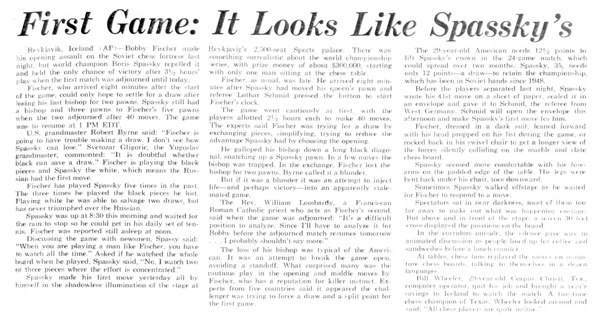 First Game: It Looks Like Spassky's 12 Jul 1972, Wed Newsday (Nassau Edition) (Hempstead, New York) Newspapers.com
First Game: It Looks Like Spassky's 12 Jul 1972, Wed Newsday (Nassau Edition) (Hempstead, New York) Newspapers.com
St. Louis Post-Dispatch St. Louis, Missouri Wednesday, July 12, 1972 - Page 26
Spassky Wins Opener With Poisoned Pawn
Reykjavik, Iceland, July 12 — World champion Boris Spassky won the first game in his world title chess series against American Bobby Fischer.
Fischer, in a hopeless position, resigned. He stood up, folded his score sheet and walked out of the Reykjavik sports palace.
The victory gave Spassky a 1-to-0 lead in the match and an important psychological advantage. Fischer has never beaten Spassky. His winless streak against the Russian now stands at six games.
Fischer's resignation came after he had walked out once, apparently in objection to move cameras in the back of the hall. He stormed offstage and did not return for 30 minutes.
Then a while later, Fischer indicated he had given up by reaching over and stopping the clock. Park bench players usually do it by turning their king on its side.
He shook hands with Spassky and before he left, Fischer turned and waved to the crowd. The spectators applauded Spassky.
Yesterday's play had been adjourned after 40 moves, and chess experts conceded then that Spassky held the edge.
Spassky opened as many had expected, with P-Q4, and Fischer adopted a Nimzo-Indian defense, an Indian or flanking development opening that was perfected by the Late Danish grandmaster, Aaron Nimzovitch. For a while it seemed as though they were heading toward a draw.
Then, on the twenty-ninth move, the game exploded. Spassky offered a pawn that, in the opinion of the experts, could not be taken. It was a so-called poisoned pawn, for if Fischer took it his bishop probably would be trapped.
Fischer took it and gasps of surprise swept through the auditorium.
It will not be determined until Fischer talks whether he had miscalculated or had decided to take Spassky's dare.
The match could last 24 games. Fischer needs 12½ points (at 1 point for a victory and ½ for a draw) to win; Spassky needs only 12 points to retain his title.
Spassky, 35, dressed in a dark business suit that included a vest, arrived promptly at 5. He spoke to the referee, Lothar Schmid, and made his first move. Schmid then started Fischer's clock. Fischer turned up seven minutes later wearing a business suit and a white shirt.
In each day's session, each player has 2½ hours to make 40 moves.
If the interior of the auditorium resembled a place of worship — from time to time a large “silence” sign blinked on — the exteriors were more reminiscent of Yankee Stadium at the seventh-inning stretch. Even hot dogs were on sale.
There is a large cafeteria in Exhibition Hall and hundreds of chess lovers preferred to watch the action over television monitors, pocket chess sets in front of them, drinking beer or eating pastries.
Downstairs there was a lecture room in which experts presided over a demonstration set hung on the wall. This room was crowded with spectators jostling one another and even hear the analyses.
The closed-circuit television standing on chairs to see and was sharp and clear. Every so often the lens shifted to a picture of the players or to a close-up of the board, the marble inlay that artisans had worked so hard to perfect. It had been installed only yesterday and met with the approval of both players.
The Post-Crescent Appleton, Wisconsin Wednesday, July 12, 1972 - Page 2
Little Excitement in First Match by Isaac Kashdan
Los Angeles (AP)—Soviet titleholder Boris Spassky had good prospects for a win when the first game of the world championship chess match between the Russian and Bobby Fischer of the United States was adjourned Tuesday.
Actually, until near the end, it was one of the dullest championship contests on record. It was no surprise when Spassky, who had the white pieces and made the first move, started with advance of his queen pawn.
After 40 moves and five hours of play, Spassky was a bishop ahead. The U.S. challenger had five pawns to Spassky's three and his king was better placed. This may prove to be sufficient compensation.
When the game was adjourned, Spassky wrote down his 41sty move and sealed it in an envelope which he gave to the match referee, in accordance with regulations.
Move Recorded
The envelope will be opened and the move revealed to Fischer at 5 p.m. Reykjavik time Wednesday, when the game will be resumed in the Icelandic capital.
Long hours will be spent by both players and the seconds in examining all the possibilities of the position. Each principal has a grandmaster to assist him, Yefim Geller for Spassky and the Rev. William Lombardy for Fischer.
Of most interest to chess buffs in the opening game was the question of who would be the aggressor.
Would Spassky try for a quick initiative, or would he develop quietly to see what Fischer would do? Fischer practically always goes for a win, whether ahead or behind.
Each of the players has been preparing for the other for years. They knew that some day they would meet in a set match, and that the stakes would be high.
Each one knows every published game of his opponent. Each has undoubtedly prepared many innovations specifically for this match. Would one of them be sprung in the opening game?
Fischer played a defense popularized in the 1920s by Aron Nimzovitsch of Denmark.
For the first nine moves, the game was identical to one played in 1951 between Petrosian and Tolush of the Soviet Union.
Two moves later, the queens were exchanged, and the pawn formation was left in exact balance. More pieces soon went off the board, including all the rooks by the 23rd move. At that point, it seemed only a question of time before one of the players would propose a draw and the other would accept. The chance of error was not worthy of consideration with players of this stature.
But it happened. On his 29th turn, Fischer took a pawn that was unprotected. Both players knew that the bishop which captured the pawn could be trapped. What had Fischer seen?
It must be put down to a rare miscalculation by the American genius. Perhaps he had thought of a resource by 32. … P-R6, when the bishop might escape.
Spassky could then continue 33. K-N4 B-N8; 34. KxP BxPl 35. B-Q2 and the black bishop is still lost.
In the remaining moves of the session, Fischer put up all the resistance possible. It remained to be seen whether he could recover from the one error.
In describing chess play. K stands for King, Kt or N for Knight, Q for Queen, R for Rook, B for Bishop, P for Pawn. The hyphen indicates a move, the “x” a capture of a piece and the numbers the position on the board. Thus B-Q2 indicates that the Bishop has been moved to the second square from the end of the board and in front of the Queen's original position.
Lancaster New Era Lancaster, Pennsylvania Wednesday, July 12, 1972 - Page 46
Spassky Reduces Fischer's Forces
Reykjavik, Iceland (AP) — With Bobby Fischer struggling to escape with a draw, Boris Spassky resumed play here today in their adjourned first game, further reducing Fischer's forces with a pawn exchange.
The opening game of the world championship was adjourned Tuesday night after 40 moves.
Fischer and the defending champion from Russia left the table with the American in a difficult position.
Sealed Envelope
Spassky's 41st move was written on a slip of paper, put in a sealed envelope at the close of play Tuesday night and given to Chief Referee Lothar Schmid of West Germany.
Schmid ceremoniously opened the envelope at 5 p.m., 1 p.m. EDT—and made Spassky's move.
The two competitors, their seconds and chess enthusiasts throughout the world spent part of the overnight break analyzing possibilities for the 11 pieces remaining on the green-and-white chessboard in Reykjavik's sports hall: king and five pawns for Fischer; king, bishop and three pawns for Spassky.
The match had appeared head for a draw until Fischer tried to seize the initiative on his 29th move.
The lanky Brooklyn, N.Y., challenger galloped his bishop down a long black diagonal to snatch an unprotected pawn Spassky had offered. A few moves later the bishop was trapped and lost in exchange for two pawns.
A Blunder
U.S. grandmaster Robert Byrne said it was a blunder and commented, “Fischer is going to have trouble making a draw. I don't see how Spassky can lose.”
Analyzing the game for The Associated Press, international grandmaster Isaac Kashdan termed Fischer's move “a rare miscalculation by the American genius.” He said it gave Spassky good prospects for a win.
Svetozar Gligoric, the Yugoslav grandmaster present at the tournament, said, “It is doubtful whether black can save a draw.” Spassky, who had the first move, is playing the white pieces, Fischer the black.
Played 5 Times
Fischer has played Spassky five times in the past, losing all three times he played the black pieces and getting draws both times he played the whites and had the advantage of the first move. But London bookies have made the 29-year-old American the favorite over the 35-year-old Russian in the 24-game championship.
A draw counts half a point and a win a point. To dethrone Spassky, Fischer needs 12½ points while the Russian can retain his crown with 12 points.
The second game of the match is scheduled for Thursday and the third Sunday. The contest may last two months.
Caption: Spassky's Next Move Sealed in Envelope. Boris Spassky, left, hands sealed envelope containing his next play to Lothar Schmid, chess referee, at end of Tuesday's session, for continuation of the chess game today as Bobby Fischer waits.
The Lexington Herald Lexington, Kentucky Wednesday, July 12, 1972 - Page 14
Opening Move, and Bobby's Missing Due to Failure of Icelandic Police to Clear Passage Thru Traffic
Boris Spassky, defending world chess champion from Russia, makes his opening move Tuesday in this year's championship match with challenger Bobby Fischer in Reykjavik, Iceland. Fischer wasn't around to see it, arriving seven minutes later but in plenty of time to make his first move. (AP Wirephoto).
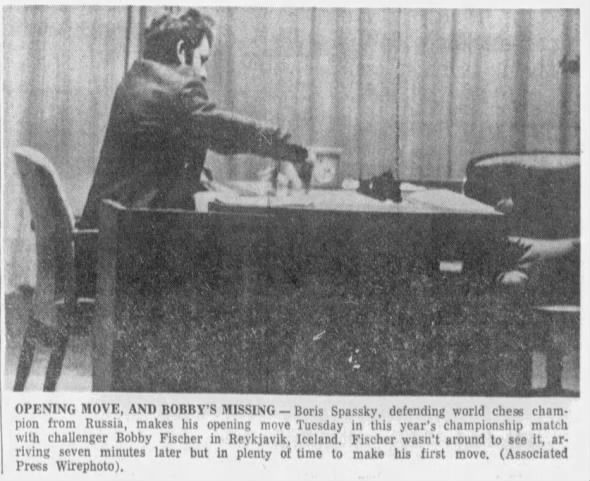 Opening Move, and Bobby's Missing Due to Failure of Icelandic Police to Clear Passage Thru Traffic 12 Jul 1972, Wed The Lexington Herald (Lexington, Kentucky) Newspapers.com
Opening Move, and Bobby's Missing Due to Failure of Icelandic Police to Clear Passage Thru Traffic 12 Jul 1972, Wed The Lexington Herald (Lexington, Kentucky) Newspapers.com
The Charlotte Observer Charlotte, North Carolina Wednesday, July 12, 1972 - Page 1
Chess Match Is Adjourned With Spassky In The Lead
Reykjavik, Iceland — The first game of the world chess championship adjourned Tuesday night with defending champion Boris Spassky of the Soviet Union holding a formidable lead over challenger Bobby Fischer of the United States.
After 4½ hours and 40 moves, Spassky held the only chance for victory in the first of the 24 games. The most Fischer can reasonably hope for is a draw when the game is completed today at 1 p.m. EDT.
Fischer arrived at the match eight minutes after it started ([due to delay in traffic, that Icelandic police failed their obligations to offer escort under “police protection”]). After numerous exchanges, Spassky trapped Fischer's bishop and captured it on his 35th move.
Before the players separated, Spassky wrote his 41st move on a sheet of paper and gave it to referee Lothar Schmid of West German. Schmid will open the envelop and make Spassky's first move for him this afternoon.
Spassky and Fischer played briskly in the opening moves and traded queens in the 11th and 12th moves.
The pair traded pawns in the 9th and 10th moves and played even through the 20th move with neither holding a piece advantage.
Each player must complete 40 moves within 2½ hours after the game begins.
Spassky, playing white, opened the match with a queen's gambit. Fischer responded with a Nimzo-Indian defense, and no advantage was apparent for some time. Many experts predicted a draw.
The players traded several pieces, including queens, within the first 20 moves. Fischer checked Spassky on the 19th move, but the Russian escaped.
The match, being played for a $250,000 purse as well as the world title, already has been delayed twice from its originally scheduled starting date of July 2. The winner will receive $150,00, the loser $100,000.
Caption: Chess Battlers Boris Spassky and Bobby Fischer Meet…Sketch Depicts World Championship Match.
The Spokesman-Review Spokane, Washington Wednesday, July 12, 1972 - Page 7
Checking on the Grandmasters
Spokane Chess Club champion Peter Torkar, left, and Richard Totusek play out the move of the Fischer-Spassky world championship chess match. The board shows the adjourned position of Tuesday. Game will be concluded today in Iceland.
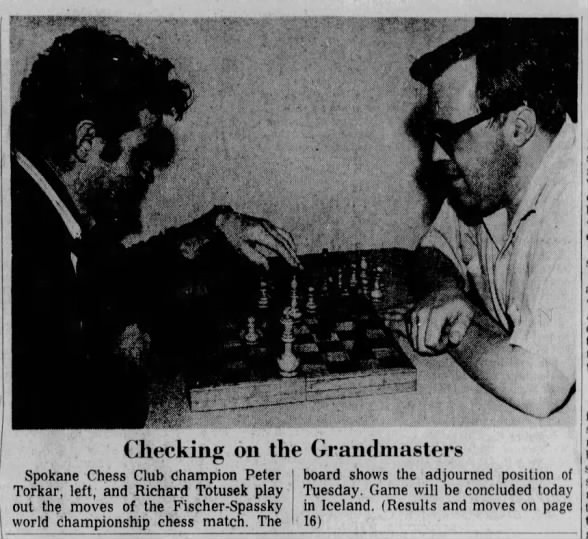 Checking on the Grandmasters 12 Jul 1972, Wed The Spokesman-Review (Spokane, Washington) Newspapers.com
Checking on the Grandmasters 12 Jul 1972, Wed The Spokesman-Review (Spokane, Washington) Newspapers.com
Livingston County Daily Press and Argus Howell, Michigan Wednesday, July 12, 1972 - Page 23
Double Dribble
In chess, Bobby Fischer of the U.S.A. and Boris Spassky of Russia are finally beginning their world championship match. This most intellectual of games demands both physical and mental conditioning. The two geniuses will be playing the best of a 24 game series. On Sunday afternoon, ABC plans to televise the highlights of the first three games. We will be watching. It should quite a change from the Miami Beach circus scene which has dominated TV this week.
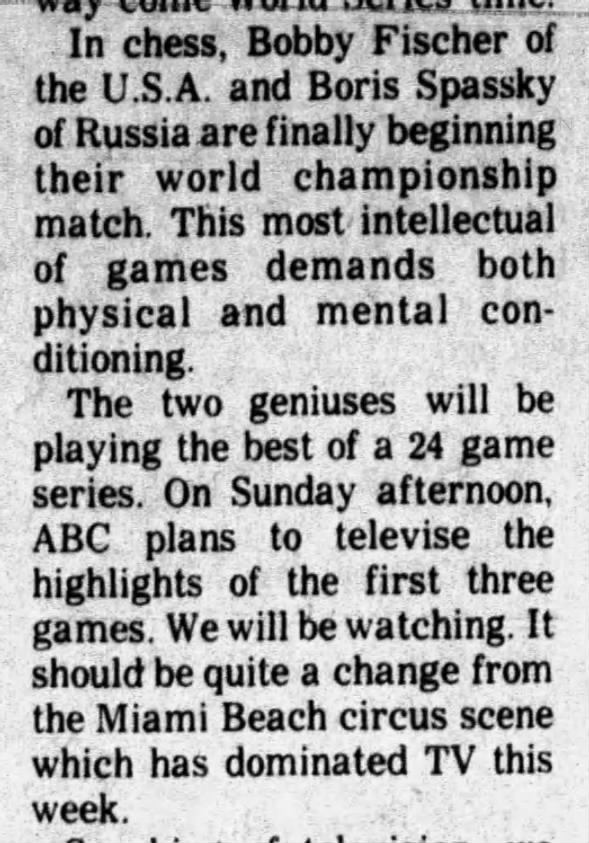 Double Dribble 12 Jul 1972, Wed Livingston County Daily Press and Argus (Howell, Michigan) Newspapers.com
Double Dribble 12 Jul 1972, Wed Livingston County Daily Press and Argus (Howell, Michigan) Newspapers.com
Evening Standard London, Greater London, England Wednesday, July 12, 1972 - Page 13
Spassky's Next Move—Sealed Up by Leonard Barden
BORIS SPASSKY slept peacefully in Reykjavik last night while his seconds Ewfim Geller and Ivo Ney analysed the unfinished end game in the world chess match.
Seconds in international chess are on the payroll just so that a player can rest and be shown the winning or drawing moves before the game is resumed. Squads of masters in Moscow's Central Chess Club are also analysing the position and working out ways to beat Bobby Fischer.
Fischer analyses on his own or with his second, Grand Master William Lombardy.
Can Spassky win? It all depends whether his king and bishop can stop and catch the black pawns on the king's side. Spassky put his 41st move into a sealed envelope ready for the resumption at 5 p.m. this afternoon.
Adjourned
With smart tactics, he adjourned half an hour early to enable his seconds to analyse rather than try to work out a win across the board.
Almost certainly Spassky has sealed 41. PxP forcing Fischer to recapture by 41. KxP. Can Spassky now break through with his king? Probably not, for if 42. K-R5 Fischer keeps the king out by 42. K-B4.
Can Spassky stop Fischer's pawns? Certainly yes, for instance by 42. B-Q6ch P-K4; 43. K-R3 P-N4; 44. K-N2. The Grand Masters in Reykjavik and Moscow hope to find a way for Spassky's king and bishop to drive back Fischer's king and then capture Fischer's pawns while Fischer's second is looking for a way to hold the pawns by stalling tactics.
The experts all forecast a draw at best for Fischer. Many of them, such as Yugoslav champion Gligoric, believe that Spassky must win. After a night of hard work, the Grand Masters will have reached a clear-cut verdict.
What do you think?
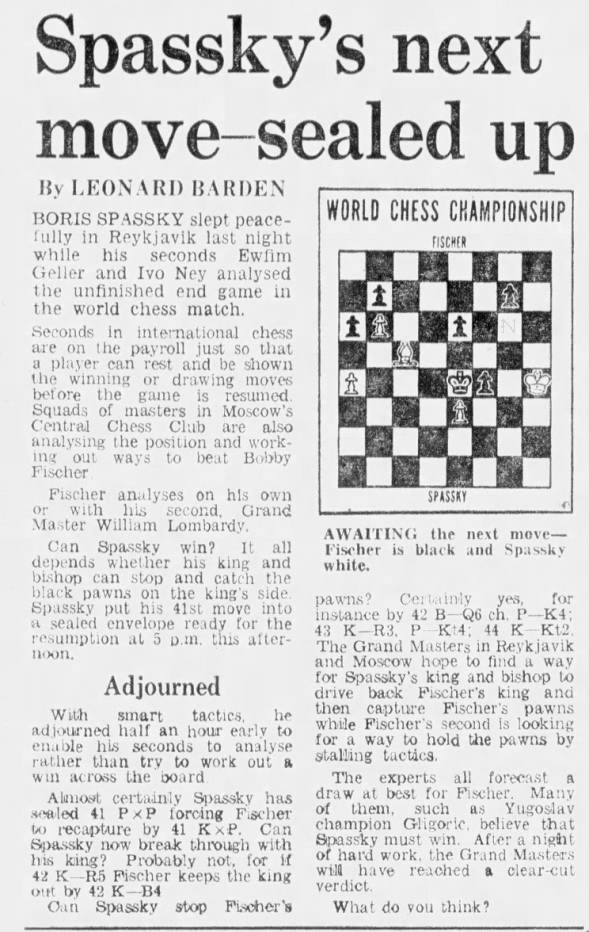 Spassky's Next Move--Sealed Up 12 Jul 1972, Wed Evening Standard (London, Greater London, England) Newspapers.com
Spassky's Next Move--Sealed Up 12 Jul 1972, Wed Evening Standard (London, Greater London, England) Newspapers.com
The San Francisco Examiner San Francisco, California Wednesday, July 12, 1972 - Page 2
1st Game to Spassky -- Fischer Protests TV
Reykjavik — (UPI) — World chess champion Boris Spassky of Russia defeated Bobby Fischer in the first game of their $250,000 championship match today, putting the unpredictable American one point behind in what could be a 24-game series.
Fischer, who had stopped play in the game for 35 minutes to protest the presence of two closed circuit television cameras high above the contest stage, conceded to the Russian on the 56th move.
He gave up when he saw he could not prevent Spassky moving his only surviving pawn to Fischer's side of the board, thus turning it into a queen, the most powerful piece in game.
Fischer stood up, made a helpless gesture to the audience and walked off. The second game was scheduled for tomorrow.
Cameras Covered
Play in the interrupted first game resumed on time, but Fischer walked out after three moves to protest the two television cameras. Match organizers covered the cameras with a cloth, but Fischer said they still bothered him.
Spassky made the first move today, taking one of Fischer's remaining pawns. Fischer then took a pawn from Spassky with his king.
After 40 moves and 4½ hours of play yesterday, Spassky held the advantage with a bishop and three pawns against Fischer's five pawns. Play was halted when Spassky, 35, asked for an adjournment and Fischer agreed.
Experts agreed that only the Russian master could win the first game. They said the best Fischer could hope for was a draw.
One Point
The match may go for 24 games. Spassky as champion must get 12 points to win. Fischer as challenger must get 12½. Each win counts for one point and a draw ½ point.
The two chess masters have played each other five times in the past. Spassky won three of the matches and two were draws.
Fischer, 29, arrived for yesterday's opening game eight minutes after Spassky, playing the white pieces, made his first move. The American challenger responded to Spassky's opening queen gambit by setting up a Nimzo-Indian defense.
The two exchanged major pieces, including the queens in the 11th and 12th moves of the game.
Playing briskly, Fischer pulled a bishop back to queen two on the 14th move to prepare the way for active use of his rooks.
Ended Chance
Then Fischer made a move that most experts said ended his chance of winning the game.
The American took Spassky's king rook pawn with his bishop, but left his last remaining major piece trapped.
Spassky then showed why he is world champion by quickly taking Fischer's bishop while losing only two of his pawns.
Chess experts could not explain why Fischer moved into what appeared to be a trap by Spassky.
“He took a chance to win a chance,” said Danish grandmaster Jens Enveoldsen.
Walks Around
Fischer, obviously displeased with his playing, fidgeted in his special swivel chair and frequently got up and walked behind the stage.
The first game was delayed nine days when Fischer, demanding ([the prize money, as it was reduced by arm-twisting tactics by the Soviets, be increased to a more equitable sum, such as bid by Australia, a grand total of $225,000 which the Soviet snubbed by their whining, tantrums, and threats that Spassky would not be allowed to play unless the Soviet always gets IT'S way]) did not show up for the opening ceremonies ([and Fischer was correct to boycott the scheming, plotting that went on for months, including refusal of organizers to properly meet with him, to iron out the arrangements long before the match began instead of throwing it together as they went along]) and when Spassky ([who had Moscow breathing down his back]) angered by the American's behavior ([because if he didn't appear angered, the repercussions back in Moscow would be unthinkable]) demanded that he ([Fischer]) be punished.
The match itself was in doubt until Fischer personally delivered an apology ([but the Soviets have yet to offer their apology for choosing the RACIST HAVEN of Iceland, whose “professional class” strongly sympathized with Adolf Hitler during World War II and made secret agreements forbidding persons of color to serve at the Keflavik base, but we're not supposed to know that, according to Powers That Be controlling FIDE and upper echelons of the chess world. Neatly brushing their White Supremacist racism under the rug. Along with rampant Anti-American hostility which pre-existed in Iceland before 1972, the Soviet carefully calculated Iceland's virulent anti-American hostility would demoralize Fischer during the match]) to the Russian and Spassky withdrew his demand that Fischer forfeit the first game.
Caption: ACTION (IF THAT'S THE WORD) IN THE GREAT INTERNATIONAL CHESS MATCH
Bobby Fischer carefully studies the board before making his move against Boris Spassky. — AP Photo
Dayton Daily News Dayton, Ohio Wednesday, July 12, 1972 - Page 2
Fischer Walks Off Stage In 2nd Chess Meeting
Reykjavik, Iceland —(UPI)—Unpredictable American chess challenger Bobby Fischer made three swift moves in the second round of his first game with world champion Boris Spassky today, then stalked off the stage.
There was no immediate indication where Fischer went or if he would return. The two players arrived moments before the scheduled 5 p.m. (1 p.m. EDT) starting time and played quickly.
SPASSKY and Fischer traded pawns and then each player made two more moves before Fischer arose from his special leather and metal swivel chair, whispered something to the arbiter and stalked off the stage.
The first of the possible 24 games in the $250,000 match started Tuesday and adjourned after 4½ hours. Spassky was given the edge at the adjournment and most experts said the best Fischer could probably get would be a draw.
The game took a sudden turn in Spassky's favor just before adjournment when Fischer took a chance and lost.
The lanky Brooklyn, N.Y., challenger galloped his bishop down a long black diagonal to snatch an unprotected pawn Spassky had offered. A few moves later the bishop was trapped and lost in exchange for two pawns.
U.S. GRANDMASTER Robert Byrne said it was a blunder and commented, “Fischer is going to have trouble making a draw. I don't see how Spassky can lose.”
Analyzing the game for the Associated Press, international grandmaster Isaac Kashdan termed Fischer's move “a rare miscalculation by the American genius.” He said it gave Spassky good prospects for a win.
Svetozar Gligoric, the Yugoslav grandmaster present at the tournament, said, “It is doubtful whether black can save a draw,” Spassky, who had the first move, is playing the white pieces, Fischer the black.
Fischer has played Spassky five times in the past, losing all three times he played the black pieces and getting draws both times he played the whites and had the advantage of the first move. But London bookies have made the 29-year-old American the favorite over the 35-year-old Russian in the 24-game championship.
A DRAW counts half a point and a win a point. To dethrone Spassky, Fischer needs 12½ points while the Russian can retain his crown with 12 points.
The winner will get $153,125 in prize money, the loser $91,875, and in addition they will divide equally an estimated $55,000 or more from film and television sales.
Caption: CHESS BOARD DUPLICATES FISCHER-SPASSKY MATCH AFTER 40 MOVES
Fischer's 29th Move Which Cost a Bishop Called Blunder by Expert. UPI Telephoto.
The Windsor Star Windsor, Ontario, Canada Wednesday, July 12, 1972 - Page 28
Fischer Can Only Get A Draw
Spassky first game victory possible by Harry Golombek, Special to The Windsor Star
Reykjavik—The first game in the World Chess Championship match between champion Boris Spassky and challenger Bobby Fischer was adjourned Tuesday in a position which holds out unclear winning possibilities for the champion, but only drawing chances for Fischer. The game is scheduled to be resumed today at 1 p.m. EDT, when Spassky's 41st move, sealed into an envelope at adjournment, will be revealed.
The game started off here Tuesday in most unprecedented fashion. For the first time in the history of world championship matches the challenger arrived late on the scene of action. When he did come, he played with almost dazzling speed, and Spassky himself was infected by this and played more quickly than is usual in a match of this great importance.
Since Fischer is known for his predilection for the Grunfeld Defence, it was a little surprising that he drifted into the Nimzo-Indian opening. Maybe he feared to use the Grunfeld again after his loss to the world champion at the Siegen Olympiad in Germany in 1970.
At first the experiment appeared rewarding, at least as far as the draw was concerned.
Early exchange of the queens was followed first by the exchange of minor and then by the exchange of major pieces, so that very rapidly the game came down to a level bishop and pawn ending.
Surely this was going to be a draw, we all thought. Suddenly there came a most astonishing twist to the game. Against all expectations Fischer captured a rook pawn with his bishop and doomed the bishop to destruction. Could the grandmaster have overlooked something or had he seen deeper than the rest of us?
The general feeling among the experts in the hall was that what winning chances there were lay with Spassky, and, in fact, on quitting the exhibition hall, I encountered Fredrick Olafsson (CQ), the Icelandic grandmaster, who upon my asking what he thought of the position, answered, there are some winning chances for Spassky, but it is not all clear.
The only real winning chance for white lies in getting the king back so as to prevent Fischer's pawns from advancing. Once this is done, black is entirely without winning prospects. But it is not clear how white can make further progress. It is upon this problem, no doubt, that the Russian grandmaster will pass the night in analysis.
Fischer obviously was displeased with his game. After the adjournment he angrily demanded a meeting with the Icelandic organizers to complain against what he described as the noisy audience. Some 3,000 Icelanders and foreign chess enthusiasts had packed into the Lagardur Hall for the opening thriller.
Caption: BOBBY CONCENTRATES—Bobby Fischer from Brooklyn, N.Y., studies the chessboard before making his move against the Soviet Union's Boris Spassky, left, Tuesday in Laugardalsholl Hall in Reykjavik, Iceland. The action came during the first game of the 24-game match.
(EDITOR'S NOTE—Harry Golombek, an international chess grandmaster has been three times British chess champion and is a judge in six previous world chess championship matches. He is chess correspondent for The Times of London.)
Longview Daily News Longview, Washington Wednesday, July 12, 1972 - Page 13
Larger Than Life
World champion Boris Spassky and challenger Bobby Fischer are dwarfed by the giant screen above them as they meet in Reykjavik, Iceland, Tuesday for the world's chess title. The board shows the moves as they are made and the clocks record the time left for each player. (AP Wirephoto).
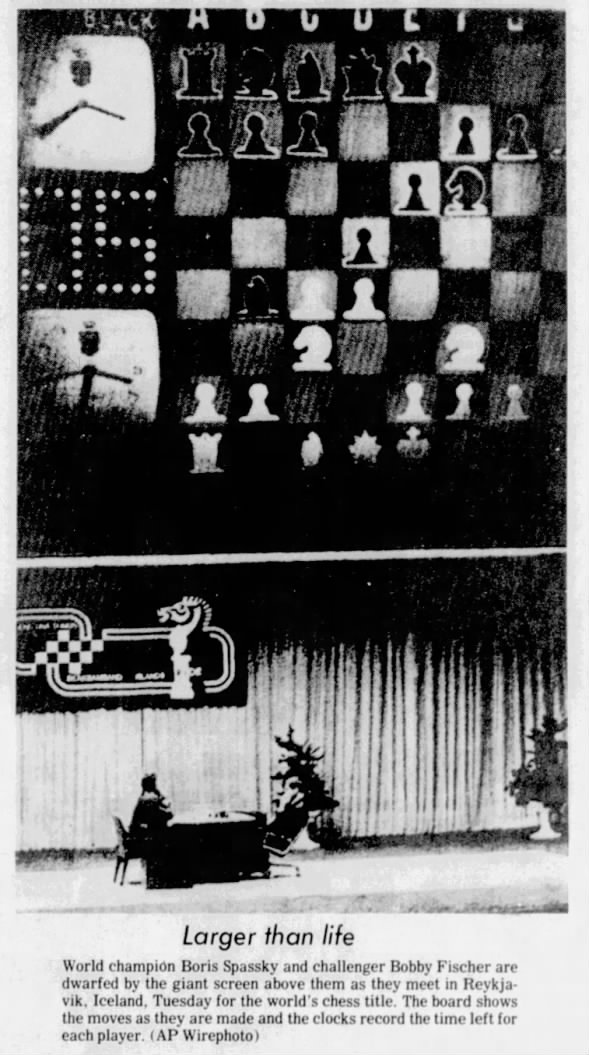 Larger Than Life 12 Jul 1972, Wed Longview Daily News (Longview, Washington) Newspapers.com
Larger Than Life 12 Jul 1972, Wed Longview Daily News (Longview, Washington) Newspapers.com
The Windsor Star Windsor, Ontario, Canada Wednesday, July 12, 1972 - Page 30
Running at a Draw by Jack Dulmage, Sports Editor
WELL, THEY ARE OFF and running at Reykjavik. And Boris Spassky is still ahead.
Spassky was ahead before they started the clocks because he requires only 24 draws to keep his world chess championship while Bob Fischer must do better if he is to take the title from him.
This could be a long, drawn-out affair involving a lot of draws. Russian players, working behind an edge, are known to play for drawn positions. Spassky may be no different.
Fischer has a history of win-at-all-costs play which sometimes has resulted in poorer tournament finishes than he might otherwise have readily achieved. But, it has also resulted in brilliance which has sometimes won tournaments and staggered the world's leading players.
This being a head-to-head match over 24 games, Fischer is generally favored. Apart from whatever technical equivalence may hold, there is considerable difference between the two in their approach to chess.
Call it a philosophical difference if you will, but in essence Fischer is motivated to acquire the crown for the greater glorification of Fischer, while Spassky hopes to prevail for the greater glorification of the Soviet Union.
AS IN ALL competition between Americans and Russians, whether it be the cold war, the arms race or chess, the rules may be the same but the ideas behind the rules are not.
If Spassky loses, he will have the right to demand a rematch. If Fischer loses, he will be back in the qualifying boondocks, not to mention what it might do to his enormous ego.
Fischer does not conceive that it is possible for him to lose to anybody over the board in match play.
FISCHER IS SIMPLY not prepared to lose which is not the case with Spassky, however much he wouldn't care for the idea.
Fischer considers himself the world's greatest chess player, and in fact concedes nothing to the greatest of legendary players of the past ([this is patently untrue as Fischer had given earlier chess players their honorable dues on many occasions]). He is good enough that his contemporaries don't take issue on that. Some thought he would have won the world title when he would have been the youngest to do so. He is now 29.
Starting with the white pieces, Spassky didn't give Fischer any opportunities to create an opening masterpiece. Presumably, the styles will change when Fischer plays white, starting Thursday and on all the even numbered games.
For run-of-the-mill chess players, white or black doesn't make much difference. To grandmasters, however, the initiative afforded by white moving first can dictate a number of things including a decisive edge if black fails to equalize, as they say.
SPASSKY THEN PLAYED very straightforward chess, developing rapidly, against which Fischer used what is known as the Nimzo-Indian-Q-Indian Complex defence.
They have names for these things, attacks and defenses. Grandmasters invariably use text-book moves in the openings which can involve, as Fine demonstrates, 55 pages of variations. These guys are familiar with all of them, so their game usually proceeds on more of less automatic lines for perhaps a half-dozen moves before one or the other strikes out in the direction of uncertain invention.
FISCHER DIDN'T DO anything reckless until they reached the end game. And then it wasn't so reckless. He was heading into a draw when he sacrificed his last piece (a bishop) in order to gain a pawn majority.
A pawn majority in an end game when the board is relatively open can sometimes be effective. In this case, it doesn't look effective, but it also doesn't look as if the sacrifice (some observers called it a blunder) will hurt his draw chances when adjourned action is resumed today.
As Harry Golombek, a grandmaster who writes chess for The Times of London, says, “…a position which holds out unclear winning possibilities for the champion, but only drawing chances for Fischer.”
I'm no Golombek, but for what it's worth, I agree with him. Spassky has the immediate problem of preventing a passed black pawn, so I'm betting he'll exchange pawns on his king bishop square, then liquidate the two black pawns on the open files.
THAT WOULD LEAVE him with an insufficient bishop-king versus king ending with the nebulous (unclear as Golombek puts it) prospect of trying to walk across the board with both pieces to get at the queen-side pawn skeleton in the hope of promoting one of his own two remaining pawns.
TO DO THAT, Spassky would have to stickhandle past the black king, now in the center of the board. Fischer might stalemate him in the process. I don't know. I debated this thing with George Ort for half an hour and got nowhere, but then George and I are not exactly grandmasters.
Anyway, Spassky hasn't got anything to worry about, yet. Let's see he does with the black.
 Running At A Draw 12 Jul 1972, Wed The Windsor Star (Windsor, Ontario, Canada) Newspapers.com
Running At A Draw 12 Jul 1972, Wed The Windsor Star (Windsor, Ontario, Canada) Newspapers.com
Battle Creek Enquirer Battle Creek, Michigan Wednesday, July 12, 1972 - Page 9
Michigan Chairs Offering Comfortable Chess Tourney
Zeeland (AP) — Thanks to a pair of unusual Michigan chairs, Bobby Fischer and Boris Spassky will have a comfortable world's championship chess match.
The chess champions began their match in Iceland Tuesday seated in identical Herman Miller chairs.
Fischer had ordered a metal and black leather chair flown in from New York Sunday. In the interests of fair play, the company ordered an identical one flown from New York last night for Spassky.
Herman Miller chairs are manufactured at the Herman Miller Furniture Co. in Zeeland and are world-famous for their unique styling.
The pair Spassky and Fischer will use retail for $524 each and are said to be ideal for long sittings. Fischer and Spassky plan a 24-game match.
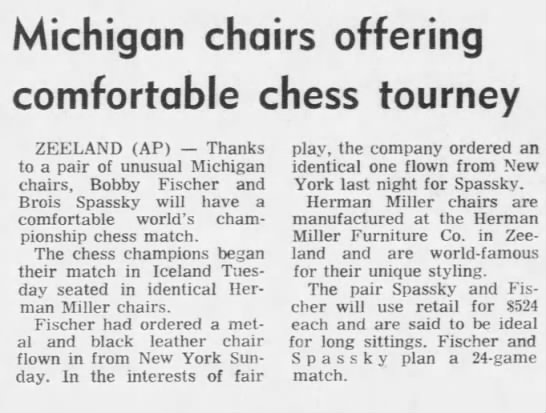 Michigan Chairs Offering Comfortable Chess Tourney 12 Jul 1972, Wed Battle Creek Enquirer (Battle Creek, Michigan) Newspapers.com
Michigan Chairs Offering Comfortable Chess Tourney 12 Jul 1972, Wed Battle Creek Enquirer (Battle Creek, Michigan) Newspapers.com
The Sumter Daily Item Sumter, South Carolina Wednesday, July 12, 1972 - Page 3
Bobby Fischer Arrives At Last
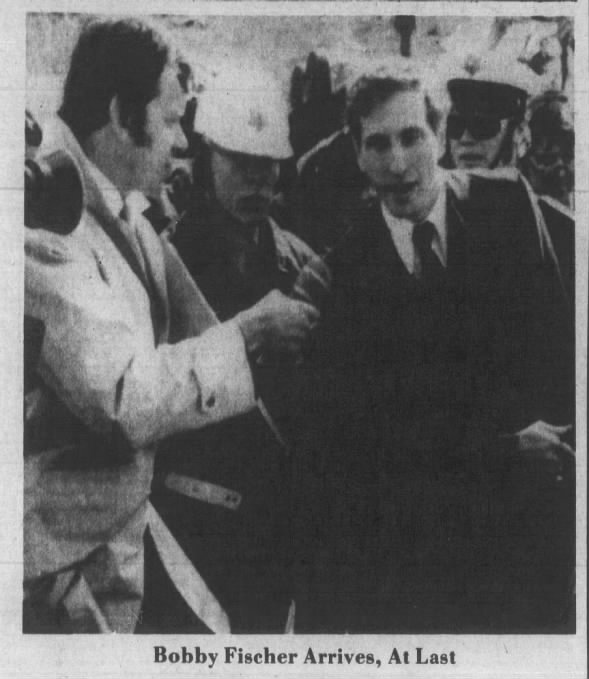 Bobby Fischer Arrives 12 Jul 1972, Wed The Item (Sumter, South Carolina) Newspapers.com
Bobby Fischer Arrives 12 Jul 1972, Wed The Item (Sumter, South Carolina) Newspapers.com
The Honolulu Advertiser Honolulu, Hawaii Wednesday, July 12, 1972 - Page 44
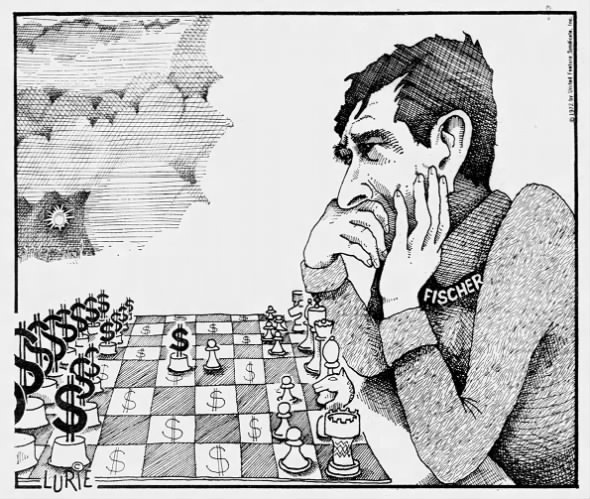 Chess Cartoon 12 Jul 1972, Wed The Honolulu Advertiser (Honolulu, Hawaii) Newspapers.com
Chess Cartoon 12 Jul 1972, Wed The Honolulu Advertiser (Honolulu, Hawaii) Newspapers.com
Fails to elaborate on the finicky, overbearing demands and complaints of European organizers who refused for months to sort out details before match. Belgrade's illegal demand of 35K USD “guarantee” refused by USCF! Australia's legal $225K bid snubbed by Russia, threatening they ‘would not play’. USSR selecting Anti-American, Racist Iceland who restricted entry of blacks and news coverage. Schemes to disqualify Fischer and replace with Petrosian, etc.
Fischer donated vast portion of his winnings to the church. Whilst the real “Capitalists” were not Robert J. Fischer as they'd have us to believe - - - “…Teng said some beautiful things about the “Polar Bear” (U.S.S.R.)…I really wish…he came right out and said what Red China had been saying for years namely that the U.S.A. and the U.S.S.R. are WORKING TOGETHER for world HEGEMONY!”
- Robert Fischer, to Pal Benko, February 26, 1979
The Independent-Record Helena, Montana Wednesday, July 12, 1972 - Page 20
Deep In Thought
Bobby Fischer, hands to his face and the side of his head, was deep in thought during the opening session of the world chess championship. (Photofax)
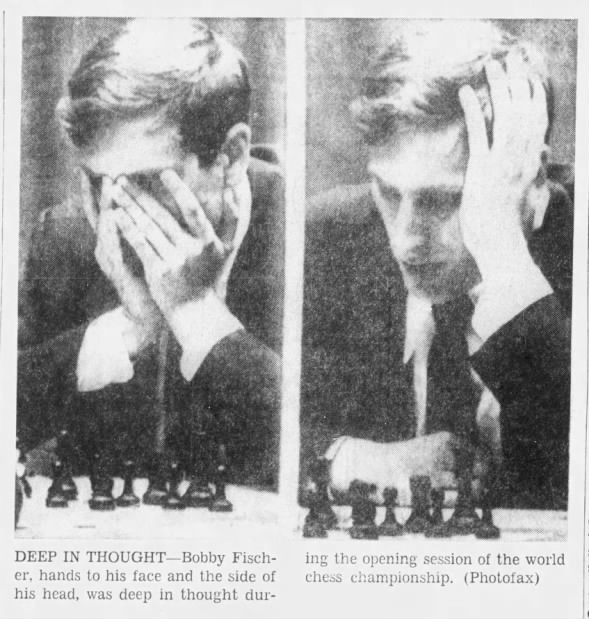 Deep In Thought 12 Jul 1972, Wed The Independent-Record (Helena, Montana) Newspapers.com
Deep In Thought 12 Jul 1972, Wed The Independent-Record (Helena, Montana) Newspapers.com
The Boston Globe Boston, Massachusetts Wednesday, July 12, 1972 - Page 12
Letters To The Editor: 'Stifle That Yawn'
In your editorial of Saturday, July 8 — The chess match (yawn) is set — you wondered if chess enthusiasts care about the world championship chess match between Spassky and Fischer.
As a director in one of the many mushrooming chess clubs in the area I can assure you that the chess community is looking forward to this once-in-a-lifetime match with great excitement.
You said that chess is genteel as ladies' tennis. Chess can also be as explosive as boxing, as emotional as basketball, as fierce as football, as boring as baseball or fast as hockey!
Now about Bobby Fischer — let's not overlook his achievements:
His sacrifices have resulted in rule changes which now make the match for the chess championship worldwide.
His demands have produced better playing conditions and more money. From $1600 in 1969 to $300,000 in 1972.
He has also put chess on the front page and on TV (Channel 2 will cover the match — including instant replay).
He has created a boom in chess, especially among the young people. The top 10 chess players in the Waltham Chess Club include three who are under 15 years old.
So stifle that yawn and visit your local chess club and share in the excitement.
In Waltham the Chess Club meets every Friday night (7-11) at the Waltham Library. And you can read Harold Dondis' wide awake chess columns (from the Sunday Globe) on our bulletin board.
PAT ARENA, Waltham
Daily News New York, New York Wednesday, July 12, 1972 - Page 321
Boris Grasps Edge; Bobby Calls Recess by Robert Byrne
Reykjavik, Iceland, July 11—Bobby Fischer is in trouble.
The brilliant 29-year-old challenger for Boris Spassky's world chess crown adjourned tonight the first game of the 24-game title match with the Russian holding the advantage of a bishop for two pawns. A stiff uphill battle faces Fischer when the game is resumed tomorrow at 5 p.m. (1 p.m. New York time) in the Laugardalshoell, Reykjavik's sports exhibition palace.
The first game of history's richest world chess title match was called after 40 moves and 3 hours and 34 minutes of play.
Neat, logical opening play had enabled Bobby to sidestep all problems with the black pieces when he suddenly ventured the risky capture of Spassky's king rook pawn at the fateful 29th move. All he would have needed for a sure draw was routine play.
And the 2,000 spectators who had applauded his appearance on the stage just a few hours before were expecting that.
Spassky Plays It Cool
But allowing his bishop to be trapped in the crude manner following 30. P-N3 was a shocker. Maybe he had counted too optimistically on 33. … P-R6, spotting, when it was beyond recall, that 34. K-N4 B-8.
35. KxP BxP, 36. B-Q2 would still deny the bishop any way of getting out of the net.
Earlier, Spassky adopted cautious tactics in choosing the secure but lackluster retreat, 9. N-K2. If he had hoped to give Fischer any problems in development after the queens were exchanged, the American's 14th move discouraged the whole idea. The attempt to win a piece by 15. BxN BxB; 16. RxB would have rebounded after … BxR, winning the exchange for Fischer.
The Rift Widens
With so much money hanging on the outcome of the match, every point won or lost opens a chasm between the two opponents. Spassky only needs 12 points to keep his title, while Fischer must take 12½ to capture the championship.
He and his second, the Rev. William Lombardy, have a grueling night's work ahead of them, if they are to come up with the miracle needed to stop Boris from jumping off to a one-point lead in the chess match of the century.
Father Lombardy, a Franciscan Catholic, said when the game was adjourned: “It's a difficult position to analyze.
“Since I'll have to analyze it for Bobby before the adjourned match resumes tomorrow … I probably shouldn't say more.”
Before the players separated tonight, Spassky wrote his 41st move on a sheet of paper, sealed it in an envelope and gave it to Schmid, the referee from West Germany.
Schmid will open the envelope tomorrow afternoon and make Spassky's first move for him.
All-Night Planning
The purpose of the sealed move is to avoid giving either player an advantage in all-night planning tonight for resumption of the game tomorrow. Spassky known his own 41st move, true; but he doesn't know Fischer's answer. Fischer, of course, is in the dark as to Spassky's 41st move.
During today's game, a large neon sign blinked on occasionally to admonish “silence.” It's purpose was to hush a low murmur in the vast auditorium.
Spectators sat in near darkness, most of them too far away to make out what was happening onstage. But above and in front of the stage, a screen 30 feet across displayed the positions on the board.
In the corridors outside, the silence gave way to animated discussion as people lined up for coffee and sandwiches before a lunch counter.
Fans Replay Game
At tables, chess fans replayed the moves on miniature chess boards, speaking to each other in a dozen languages.
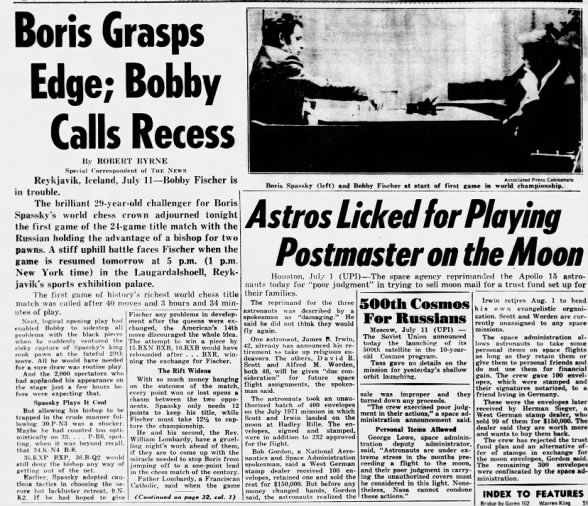 Boris Grasps Edge; Bobby Calls Recess 12 Jul 1972, Wed Daily News (New York, New York) Newspapers.com
Boris Grasps Edge; Bobby Calls Recess 12 Jul 1972, Wed Daily News (New York, New York) Newspapers.com
Daily News New York, New York Wednesday, July 12, 1972
Few Men Left, Bobby and Boris Adjourn Game
Reykjavik, Iceland, July 11 (UPI)—After 4½ hours of play, the first game of the 24-game chess match between world champion Boris Spassky of the Soviet Union and Bobby Fischer was adjourned. Forty moves were made before adjournment. Rules call for the game to be completed tomorrow.
(At the time of adjournment, Fischer's position indicated he would have to fight for a draw, the Associated Press reported.)
At adjournment, Spassky had a bishop and three pawns, and Fischer had five pawns. Each player, of course, still had his king.
Fischer arrived eight minutes late for the start, ([due to delays in traffic, which could have been prevented had the promise to offer police protection, including escort in traffic been kept]) well under the hour allowed under the rules, and Spassky had already made his first move.
The audience gave Fischer a 30-second ovation when he stepped on stage. Despite his late arrival, he appeared relaxed. He shook hands with Spassky, sat down slowly in his special swivel chair flown here from New York, studied the board for two minutes, and then made his first move.
A Brisk Game
Spassky, playing white, opened with pawn to queen four, Fischer opened with his knight to king bishop three. From there, the game proceeded briskly, the players trading pawns in the 9th and 10th moves and queens in the 11th and 12th moves.
The match, being played for a $250,000 purse as well as the world title, already has been delayed twice from its originally scheduled starting date of July 2. The winner will receive $150,000, the loser $100,000. Both will share in revenue from television rights.
Fischer, 29, of Brooklyn, N.Y., did not show up in time for the original starting date nine days ago, remaining in New York in an unsuccessful attempt to force the Icelandic organizers of the match to add a percentage of the gate to the original $125,000 purse and 30% of the television rights.
Fischer, who had beaten three international grand masters to qualify as Spassky's opponent for the title, agreed to come to Reykjavik only after a British banker doubled the purse with a personal contribution of $125,000. Then Spassky demanded a personal apology for Fischer for the delay. The American gave it to him in a letter delivered during the weekend.
Despite the television arrangements, there was no filming of today's opening match because Fischer would not permit it. His spokesmen said, however, that televising of the rest of the games might be arranged.
The match could continue for 24 games. As champion, Spassky needs 12 points to win. Fischer needs 12½. One point is awarded for a victory, and one-half point is awarded to each player in a draw.
The games will be played on Tuesdays, Thursdays, and Sundays. If games are adjourned, they will be completed on Wednesdays, Fridays, and Mondays.
Wisconsin State Journal Madison, Wisconsin Wednesday, July 12, 1972 - Page 12
Fischer Was Making Psychological Move
Sirs—It is certainly the prerogative of The Wisconsin State Journal to support whomever it wishes in the world championship chess matches, and I won't say a thing about that. But the editorial in the July 6 edition shows that the newspaper has at least one editorial writer who knows very little about championship chess matches.
Chess is very much a war of nerves. Anything one player can do to shake the confidence of the other or put him at a psychological disadvantage is generally done. In a short match, say seven games, one played each day, if one player happens to win the first two games he has a very good chance of winning the entire match whether he is actually that good a player or not. Bobby Fischer summed it up well one time when he said “I like to make them squirm.” ([“I don't believe in psychology. I believe in good moves.” — Robert Fischer. Bobby accomplished that with his chess moves, not psychological tricks and mind games which the Soviets were quite fond of using to gain unfair leverage over competitors.])
Well, Spassky won the first round in the big upcoming match. He succeeded in having the match held in Iceland. ([Again, the Soviet contribution to spoiling the match for Fischer, with Iceland's fevered Anti-American chauvinism and racism.]) Fischer would have preferred New York, London, Paris, or even Moscow ([Wrong on two counts]) — some large city with some things to do at night and during the times the actual matches are not in session. There are few things to do in Iceland. Also, Spassky is accompanied to Iceland by some 30 close friends, while Fischer has only one — another psychological advantage for a match that will probably last two or three months.
So Fischer's actions in delaying the match were not arrogance, they were an attempt to put Spassky on edge and, therefore, even out the psychological advantage. Time will tell in the coming weeks and months of the match if the attempt was successful. The actions also resulted in more money for both opponents, not just Fischer as you hinted.—W. R. Luellen, 716 Odana Lane, Madison, Wis.
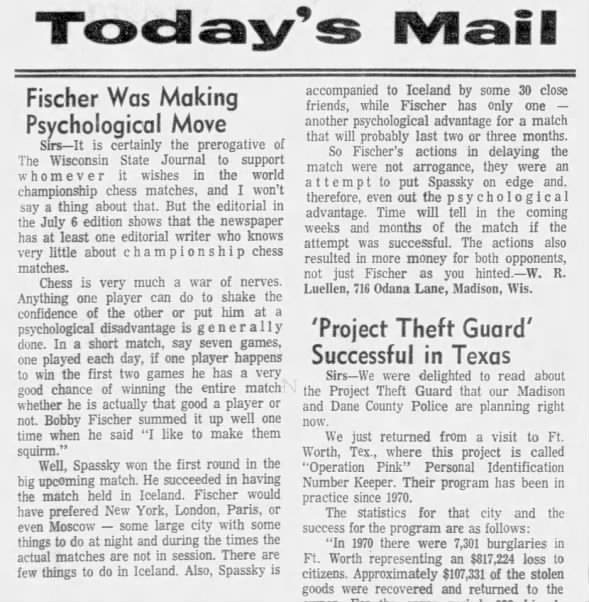 Fischer Was Making Psychological Move 12 Jul 1972, Wed Wisconsin State Journal (Madison, Wisconsin) Newspapers.com
Fischer Was Making Psychological Move 12 Jul 1972, Wed Wisconsin State Journal (Madison, Wisconsin) Newspapers.com
The Guardian London, Greater London, England Wednesday, July 12, 1972 - Page 20
Cautious Start In Iceland by Leonard Barden
The first game of the world chess championship match in Iceland was ambling towards a peaceful draw last night although, Fischer may have to struggle. The game was adjourned after 40 moves and five hours' play.
Fischer gambled in a drawn position by sacrificing a bishop for two pawns. His liking for pawn captures is notorious—he is the top specialist in an opening variation called the “Poisoned Pawn”—and the Russians quote this trait as an example of the challenger's capitalist materialist instincts.
([Which sure explains a lot, considering Spassky opened the tournament using a Poison Pawn to stump Fischer. Seems if Fischer were such a “capitalist materialistic instinctive” person based on the mastery of the poisoned pawn, he'd foresaw the outcome. Correct? Secondly, as Jim Fiebig points out in his column on Fischer accused by the Russians as a “money-grubbing capitalist” — “Fischer is a bush league amateur.” https://bobby-fischer-1972.blogspot.com/1972/07/fischer-bush-league-capitalist.html. Thirdly, Fischer gave the bulk of his prize money to a church then refused to take all those opportunities that lay before him that could have made him exceedingly wealthy. He chose to live a lifestyle more comparable to a monk than a millionaire, then went on in his future life to criticize said elitists on behalf of mankind. Not exactly what westerners would regard as “money grubbing” nor “capitalist.” However, Soviet players were quite eager to cash in on the larger cash prizes. Why didn't they too give the money to some charitable cause like Fischer did, else judged and accused themselves of being money-grubbing Capitalists and harboring double standards??])
The game reached a critical situation where Spassky was materially ahead with king, bishop and three pawns against Fischer's king and five pawns but Fischer had chances to penetrate with his king into Spassky's position.
Spassky opened with the expected P-Q4: it was the same move as in his last two wins against Fischer and it won the Guardian correspondent a small bet against a fellow writer who had forecast a king's gambit. But the move posed an immediate probing question: was Fischer willing to play the Grunfeld which had brought him to defeat at Santa Monica and Siegen against Spassky; would he choose the ambitious King's Indian which had proved a key weapon against Taimanov and Larsen, or would he spring a surprise?
The opening moves brought a paradox. Fischer, the extremist seeker after chess truth and forecaster of a 13-0 win over Spassky, opted for the solid Ragosin system which Spassky switched into a classical variation of the Nimzo-Indian.
The second phase of the game confirmed the impression that the atmosphere was cautious, mutual respect rather than all-out struggle at the start. The queens were swapped on moves 11 and 12 and with a symmetrical pawn formation a draw already looked on the cards. By move 20, each player had exchanged queens, a rook, a knight, and three pawns—what tournament professionals, who like their rest days, call a wood-chopping exercise.
The Des Moines Register Des Moines, Iowa Wednesday, July 12, 1972 - Page 8
'Fischer Will Win Where It Counts'
To the Editor: Regarding the recent articles on the Fischer-Spassky protocol fiasco in Reykjavik: Certainly the personality game the Icelanders (and others) expect from the two contenders will hardly affect the outcome for the world chess title.
Spassky can arrive on time for the ceremonial puppet shows, swap trinkets with the local heads-that-be, and further his public image (and Russia's) with smiles of mock sincerity. And it's obvious that Fischer's concern as an unofficial agent of U.S. diplomacy—well, Bobby could give a barf.
But Spassky is playing the wrong game. Unlike most public (sports) events where crowd attitudes can easily push one player or team to unequaled heights of performance or augment the slide to defeat, the quiet isolation that surrounds chess play holds no truck with the influences gained from image-building, and, for realizing this, Fischer should get credit.
Fischer's mind is direct, short-cutting its way to the best immediate solution and ahead to the ultimate move that gains him the deciding advantage. Thus, public image or no, where it counts Bobby will win. And Boris can retire to the Steppes with everlasting (haunting) memories. — Bob Getchell, 430 N. Dubuque, Iowa City, Iowa. 52240.
The Guardian London, Greater London, England Wednesday, July 12, 1972 - Page 1
Fischer's Opening Gambit
Boris Spassky and Bobby Fischer finally made it to the world championship chessboard tonight and there was an almost palpable sense of relief throughout the auditorium at the sports stadium here that chess had at last taken over from the ballyhoo.
Yet Fischer was late ([due to characteristic failure of the promised police protection “traffic escort” which resulted in Fischer being seven minutes late to the match]). Promptly at 5 p.m. Spassky walked on to the stage accompanied by the West German referee, Herr Lothar Schmid, who had raced back to Iceland from his son's car crash in West Germany.
Spassky immediately played his opening pawn to Queen four and the match was under way. Spassky sat for a while and then walked around the board. Five minutes later he and Herr Schmid had left the stage and it was bare. At 5:10 pm Spassky returned followed by Fischer. ([As described by another reporter, “Applause which greeted Fischer's arrival arose in crescendo when Spassky moved forward from the side of the stage where he had been waiting to shake Fischer's hand.”])
Fischer responded with his knight to king's bishop three — the Nimzo-Indian defence — and within five more minutes there were eight moves and the battle was well and truly under way.
In the event the game was adjourned ritually at the fortieth move when Spassky put his next move into a sealed envelope for the resumption tomorrow afternoon.
It was a fascinating evening with both players apparently aiming at an honourable draw until Fischer traded his remaining bishop for two pawns and the game took on a new dimension with a rapid removal of the principal pieces.
The theatre took on the atmosphere of an intensive care ward in hospital as the spectators tiptoed in and out and talked in whispers.
Facing the audience, a great illuminated sign occasionally flashed the command, “thogn,” which even in Icelandic unmistakably meant silence.
Outside the auditorium there was coffee and hot pies and frankfurters and great creamy cakes. Below the theatre experts were giving a live commentary on the moves — not as fast as the Derby perhaps, but no less fascinating to the people crowding in.
The game was not a sell-out. The auditorium was largely full but there were many spare seats for latecomers.
For the Icelanders there was plenty to see and do. One of the attractions was us journalists pumping out descriptions of the contest in a welter of ticker-tape and dashing in and out of the temporary telephone boxes.
Meanwhile back on the stage, the two grand masters continued to play, each move following rapidly on the other. As usual Fischer was the more restless. Full of orange juice and well stocked with apple juice for the match, he got up and wandered about. ([As did Spassky… while waiting to make his moves.])
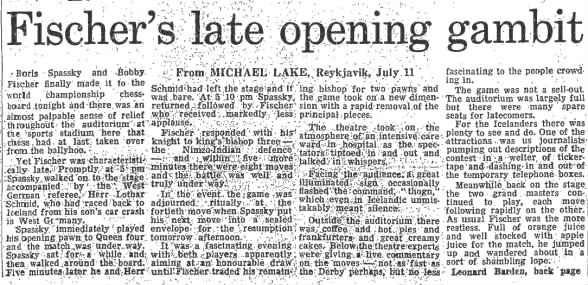 Fischer's Opening Gambit 12 Jul 1972, Wed The Guardian (London, Greater London, England) Newspapers.com
Fischer's Opening Gambit 12 Jul 1972, Wed The Guardian (London, Greater London, England) Newspapers.com
Santa Cruz Sentinel Santa Cruz, California Wednesday, July 12, 1972 - Page 2
Spassky Wins Opener
Reykjavik, Iceland (AP)—World champion Boris Spassky won the first game Wednesday in his world title chess series against American Bobby Fischer.
Fischer, in a hopeless position, resigned. He stood up, folded his score sheet and walked out of the Reykjavik sports palace.
The decision confirmed the judgment of the experts who considered Fischer was in a difficult position when the game was adjourned after 40 moves Tuesday night.
The victory gave Spassky a 1-0 lead in the 24-game match and an important psychological advantage. Fischer has never beaten Spassky. His winless streak against the Russian now stands at six games.
Fischer's resignation came after he had staged a walkout, apparently in objection to move cameras in the back of the hall. He stormed offstage and did not return for 30 minutes.
Then a while later, Fischer indicated he had given up by reaching over and stopping the clock. Park bench players usually do it by turning their king on its side.
He shook hands with Spassky and before he left, Fischer turned and waved to the crowd. The spectators applauded Spassky.
At the side of Fischer's car outside the stage door was a friend since childhood, John Collins, a wheelchair-ridden paraplegic who taught Fischer the moves when he was a kid in Brooklyn, N.Y.
Fischer rolled down the window and said, “I'm sorry for what happened. It will settle down.”
Then he drove away to the air-conditioned seclusion of his $63-a-day hotel suite.
Outside the hall Fischer was asked about a report from London that financier James Slater might not be able to get about $120,000 worth of promised prize money out of England because of British currency restrictions.
“No comment,” Fischer said. It was Slater's last-minute offer of more money which ended Fischer's two-day holdout at the scheduled start of the match.
The opening game of the world championship was adjourned Tuesday night after 40 moves.
Fischer and the defending champion from Russia left the table with the American in a difficult position.
Spassky's 41st move was written on a slip of paper, put in a sealed envelope at the close of play Tuesday night and given to Chief Referee Lothar Schmid of West Germany.
Schmid ceremoniously opened the envelope at 5 p.m., 1 p.m. EDT — and made Spassky's move.
After five minutes of play and several indecisive moves by both men, Fischer popped up, spoke animatedly to Schmid and stalked offstage.
Schmid followed him off.
There wasn't much material left on the board after the exchange. As a difficult end-game commenced Fischer had a king and, four pawns, Spassky a king, two pawns and a bishop.
Fred Cramer, a U.S. Chess Federation official who went backstage to talk to Fischer, said the American had complained about the presence of movie cameras in the back of the hall. They were about 150 feet away and seemed inaudible from where Fischer sat.
Fischer's walkout lasted about half an hour.
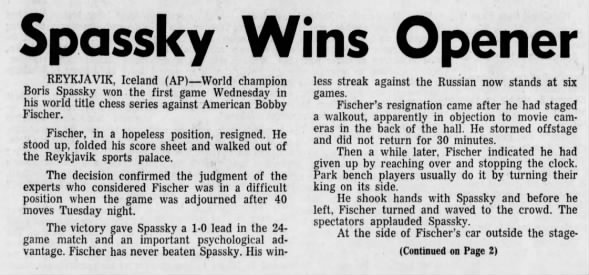 Spassky Wins Opener 12 Jul 1972, Wed Santa Cruz Sentinel (Santa Cruz, California) Newspapers.com
Spassky Wins Opener 12 Jul 1972, Wed Santa Cruz Sentinel (Santa Cruz, California) Newspapers.com
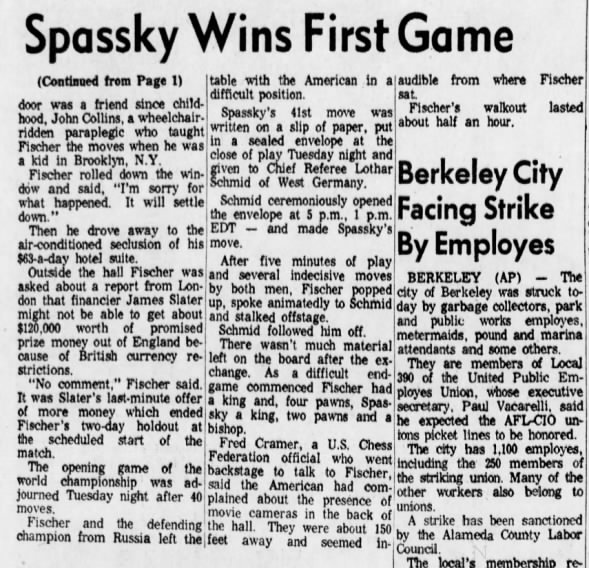 12 Jul 1972, Wed Santa Cruz Sentinel (Santa Cruz, California) Newspapers.com
12 Jul 1972, Wed Santa Cruz Sentinel (Santa Cruz, California) Newspapers.com
Arizona Daily Star Tucson, Arizona Wednesday, July 12, 1972 - Page 56
Letters To The Editor: Bobby's Antics
Editor the Star: We were amused to read your recent editorial deploring the antics of Mr. Robert Fischer on the eve of his epic battle for the world chess championship. Perhaps to an outsider, Bobby's conduct appears inexcusably coarse and unsportsmanlike, but it is this same high-handed arrogance which has catapulted him to within a hairsbreadth of breaking the 25-year long Russian stranglehold on world chess. During his 16-year “checkered” career, Bobby has not only bested an impressive array of international grandmasters in dazzling over-the-board play, but as a young boy, he weathered the sordid smoke-filled atmosphere of all-night chess emporia, withstood physical brutality at the hands of “sore-losers” seeking revenge, and yet mustered the courage to expose corrupt and unfair practices commonplace at chess competitions here and abroad. The chess world's “enfant terrible” has accomplished singlehanded what all others failed to do - namely, to challenge and excel against the Soviet conglomerate at their own national pastime.
Bobby Fischer is not in Iceland as a representative of this country, but rather as a singular chess talent. Where were all his critics when Bobby, abandoned and alone, was barely eking out a hand-to-mouth existence building this talent? And we wonder how much national interest would be focused on Bobby's “manners” if he were playing a Frenchman instead of a Russian!
Charles L. White, Marlys Hearst White, 2310 E. Seneca St.
The Columbus Telegram Columbus, Nebraska Wednesday, July 12, 1972 - Page 7
Bobby versus Boris
It's hard to make front-page news out of brain waves, but precisely that trick appears to have been accomplished by an American and a Russian. Their names are Bobby Fischer and Boris Spassky.
Envision, if you will, two men seated. Between them is a small square board. On the board are figurines, some of which are alike and some of which are different. From time to time each of the two men reaches over and moves one of the figurines. Each move provides occasion for a period of solemn thought. Brain waves, nothing but brain waves.
As chess masters, Boris and Bobby understood that the real game is not on the board, but in the mind. The problem therefore was to manipulate the opponent's mind. Biologically, this can be accomplished by doing certain things that play upon the competitor's endocrine gland system. In combat, mental or otherwise, a person's ability to respond to challenge is governed in part by a chemical excreted into the blood by certain glands. The chemical is a hormone called adrenalin which comes from the adrenal glands that are located in the vicinity of the kidneys.
Now then, these glands have only so much juice in them. When this material reaches the blood, it acts on the central nervous system in a way that causes the mind and muscles to become alert and ready for action. However, when the adrenalin supply is low, the combatant seldom is able to call upon his reserve strength. He may express himself as “feeling drained” which literally is the case.
Thus, to judge by the overt evidences related in the news stories, Bobby and Boris have been maneuvering to get an adrenal response from the other. Bobby took the initiative. His objective was to time the moment when the two would come to taw. He sought that moment at which Boris would have passed his adrenal peak. He could reasonably surmise that the Russian would arrive on the neutral ground of Iceland in a condition of moderate tension, but prepared physically by training for the big contest. The key therefore, from Bobby's standpoint, was to build on the natural tension. He did this through a series of delaying tactics, based ostensibly on the financial arrangements.
But Boris hadn't become world chess champion by milking cows in Moscow or chopping cotton in the Kazakhstan. He knew a thing or two about tension and timing himself. So just when Bobby might have supposed the time was right and was himself keyed for crucial combat, Boris invoked a delay. His announced reason was that he figures Mr. Fischer should apologize.
That's the picture. The two heavyweights of the brain waves jostle at the mark. Did Bobby anticipate that Boris would stall? Did Boris anticipate that Bobby would anticipate? Will the two opponents see-saw themselves into a condition of adrenal equality? Chess never had a finer hour.
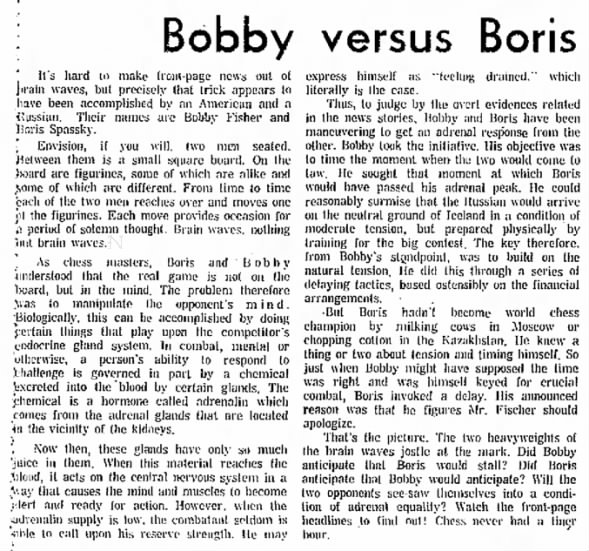 Bobby versus Boris 12 Jul 1972, Wed The Columbus Telegram (Columbus, Nebraska) Newspapers.com
Bobby versus Boris 12 Jul 1972, Wed The Columbus Telegram (Columbus, Nebraska) Newspapers.com
The Record Hackensack, New Jersey Wednesday, July 12, 1972 - Page 3
It's Your Move
Play along as Bobby Fischer challenges Boris Spassky for the world chess championship. Make your moves with this folding magnetic chess set while you watch the matches recreated on Channel 13. The board-box measures 9½x9½” open, 9½x4¾” closed and holds all 32 pieces neatly inside. The kings are a full 2” tall. Just one from our chess collection…
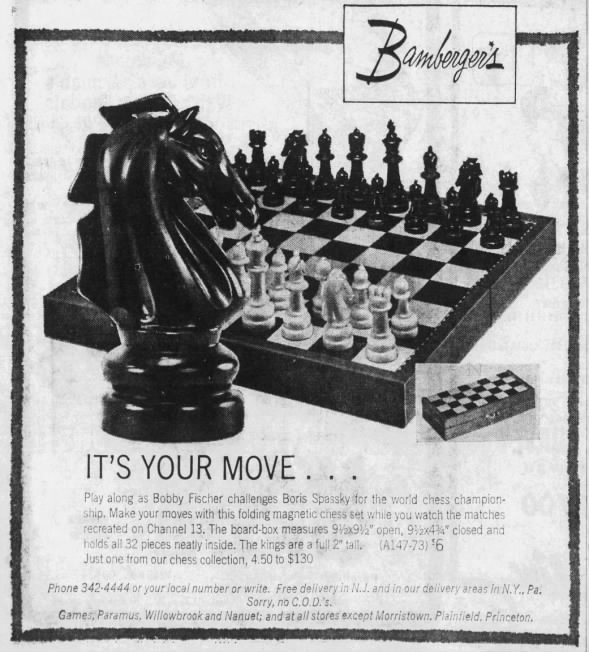 It's Your Move 12 Jul 1972, Wed The Record (Hackensack, New Jersey) Newspapers.com
It's Your Move 12 Jul 1972, Wed The Record (Hackensack, New Jersey) Newspapers.com
The Akron Beacon Journal Akron, Ohio Wednesday, July 12, 1972 - Page 6
Bobby Fischer Defended
To The Editor: If Bobby Fischer were subsidized by our government, as Boris Spassky is by his, then people would not consider him an “Ugly American,” as one writer to you put it. His challenging for the world championship of chess gives laymen a pleasure.
KENNETH J. SHAFFER, 404 Stanford Street
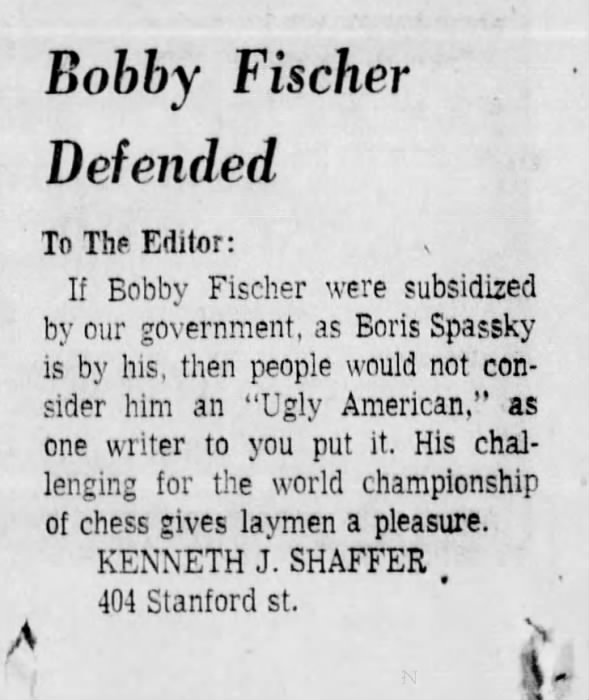 Bobby Fischer Defended 12 Jul 1972, Wed The Akron Beacon Journal (Akron, Ohio) Newspapers.com
Bobby Fischer Defended 12 Jul 1972, Wed The Akron Beacon Journal (Akron, Ohio) Newspapers.com
Fails to elaborate on the finicky, overbearing demands and complaints of European organizers who refused for months to sort out details before match. Belgrade's illegal demand of 35K USD “guarantee” refused by USCF! Australia's legal $225K bid snubbed by Russia, threatening they “would not play”. USSR selecting Anti-American, Racist Iceland who restricted entry of blacks and news coverage. Schemes to disqualify Fischer and replace with Petrosian, etc. by “Ugly Soviet Chauvinists”.

















